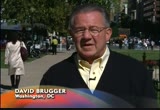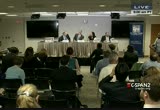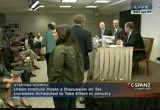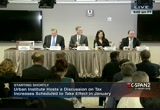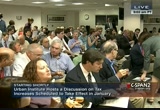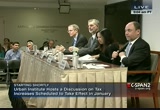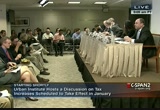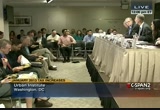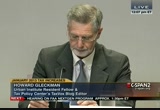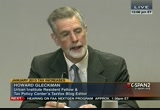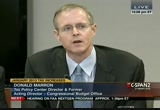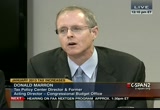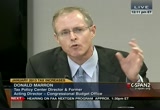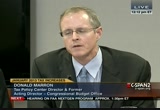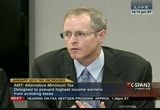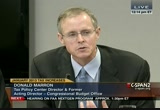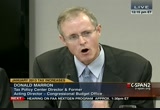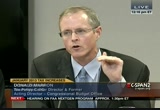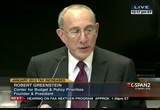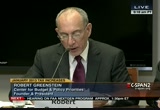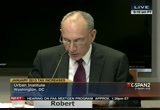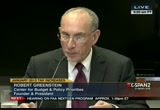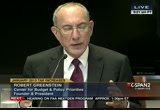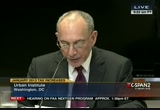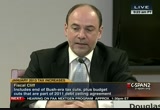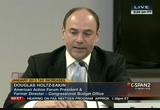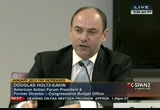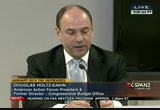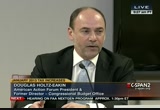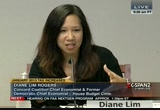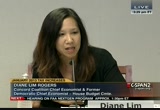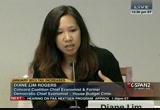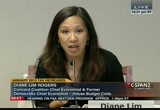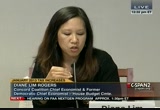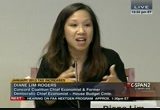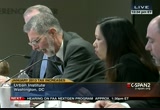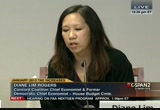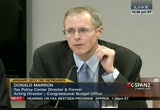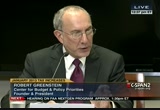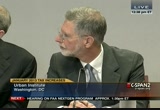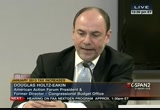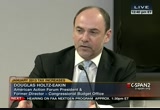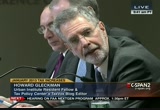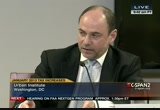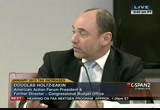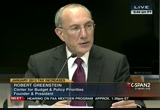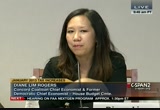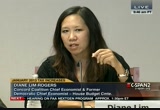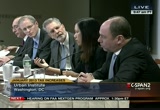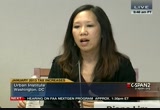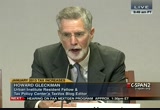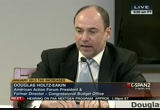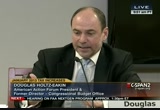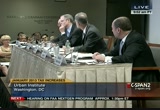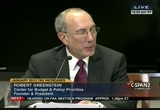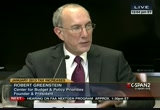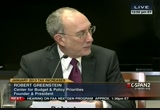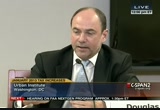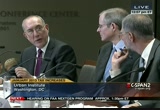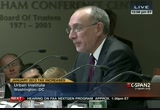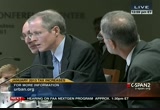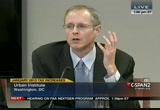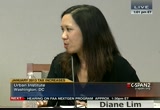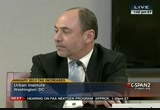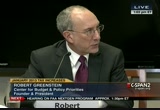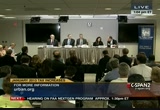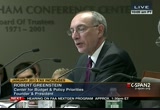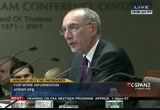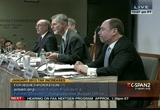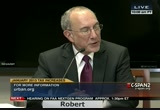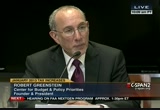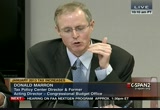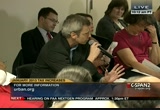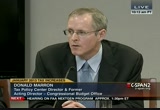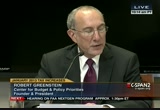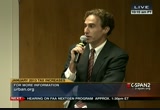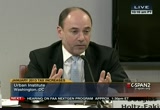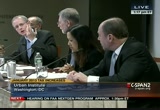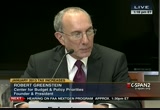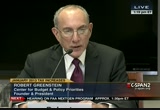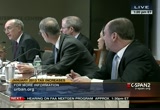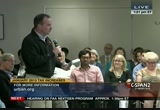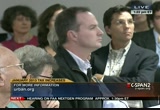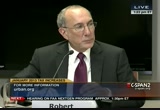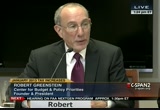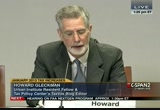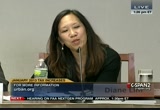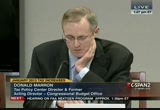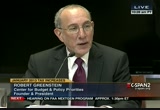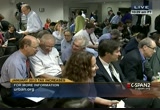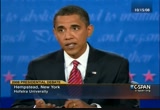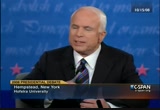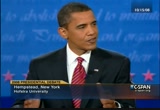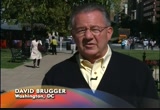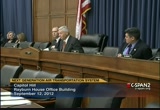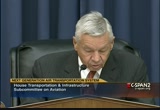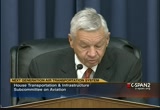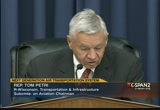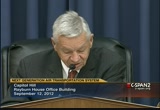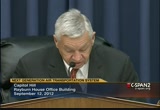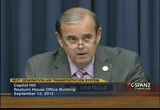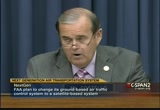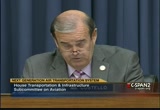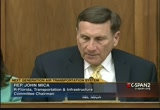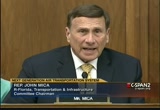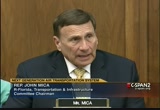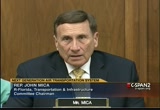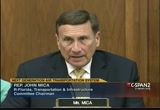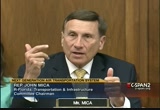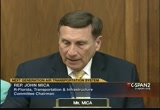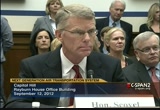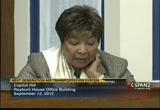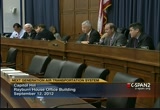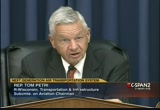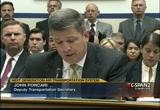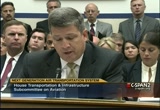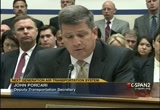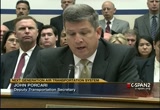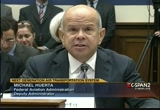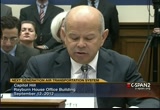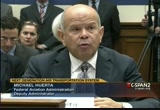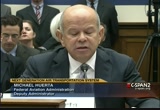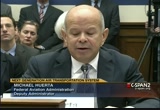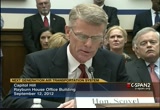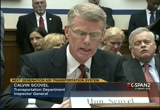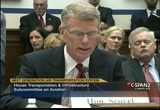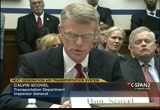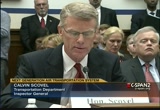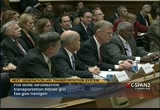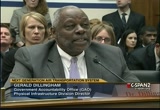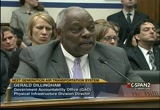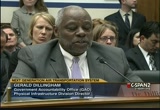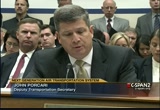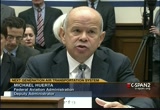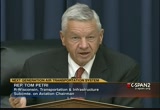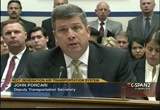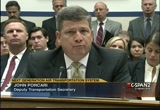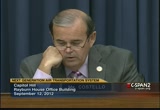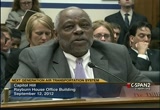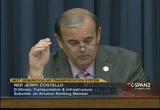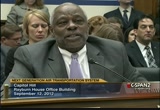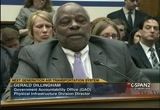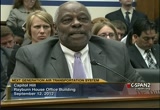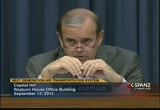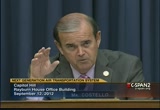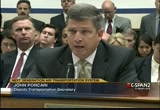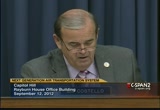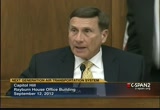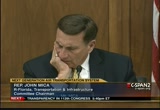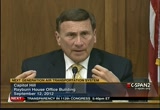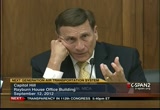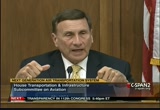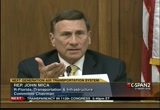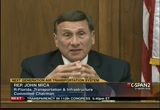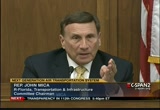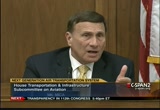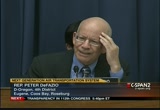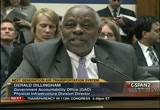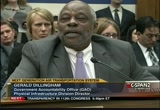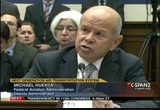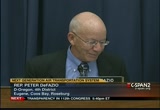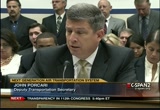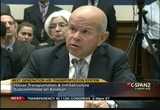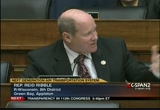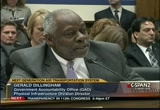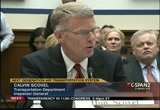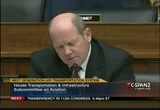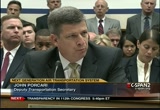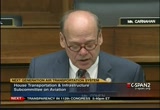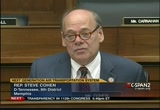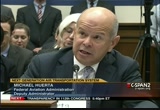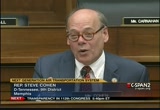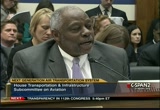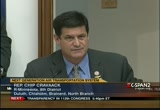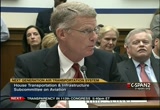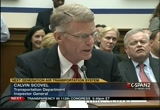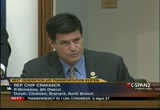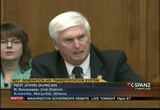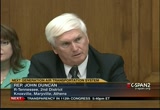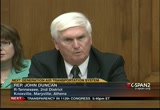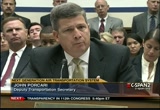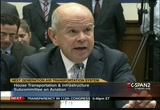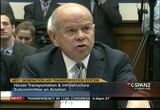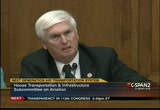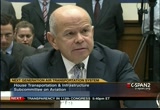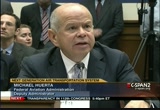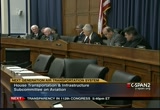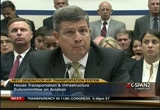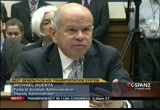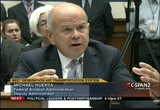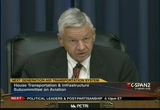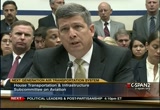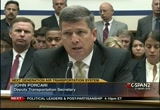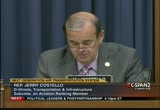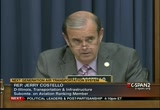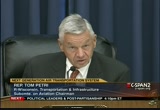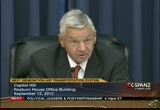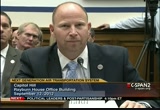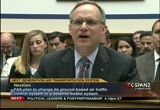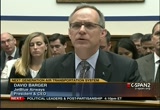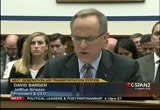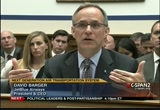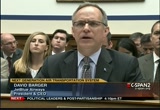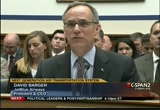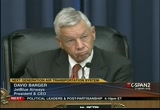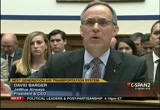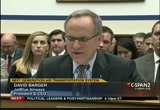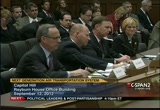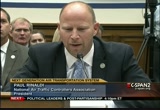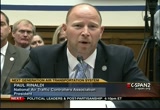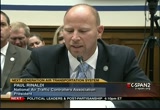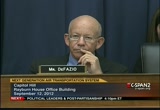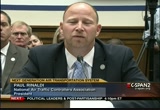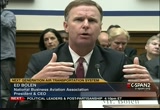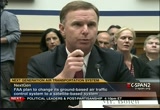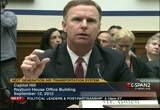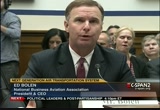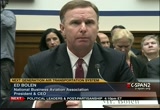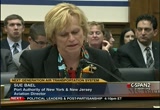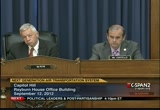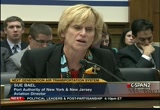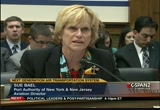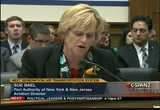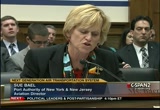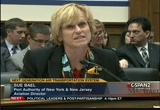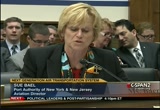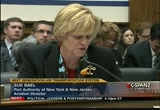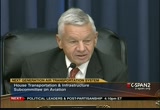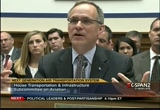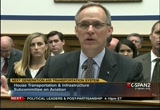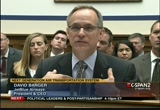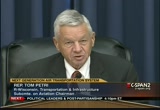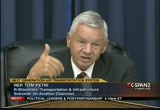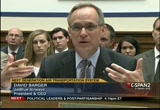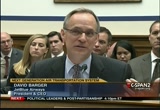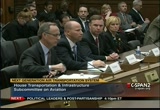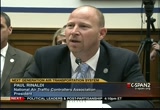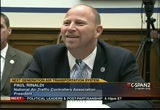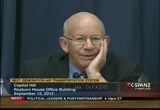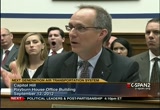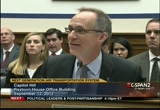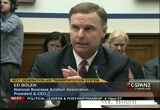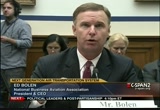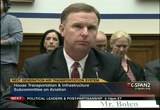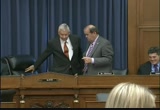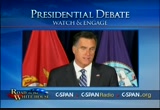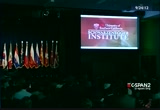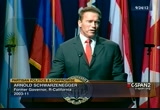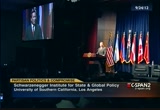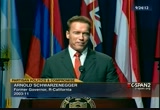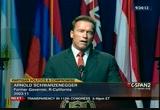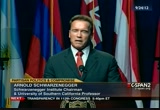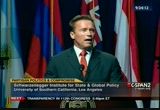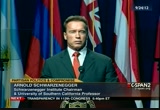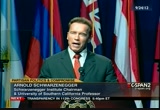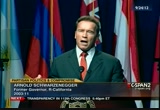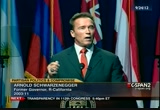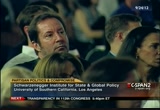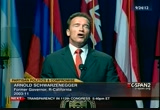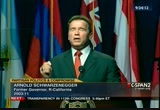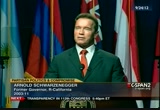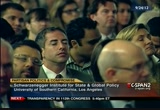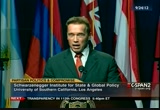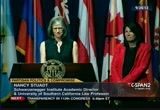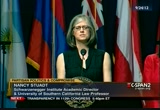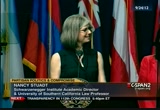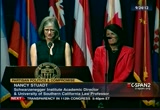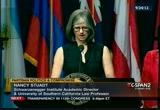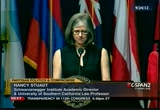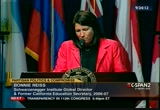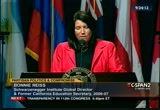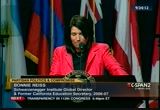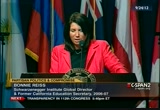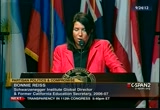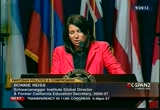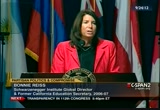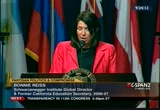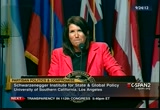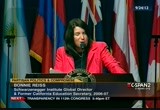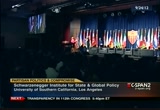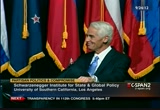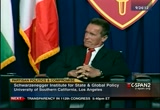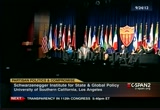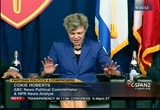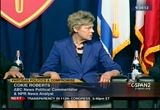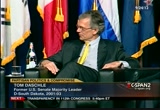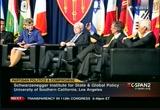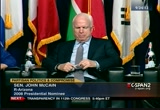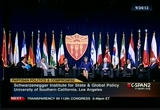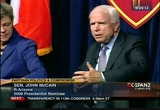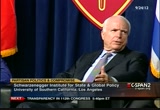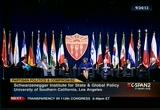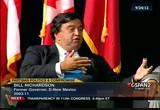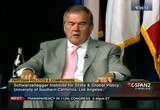tv U.S. Senate CSPAN October 2, 2012 12:00pm-5:00pm EDT
12:00 pm
12:05 pm
>> we are live this afternoon at the urban institute for a discussion on the scheduled tax increases the percent to hit in january, including the end of the bush era taxes, payroll tax holiday hikes and invested in come also. a new tax policies and to report says nothing is done. average marginal tax rates would go up by five percentage points on labor income, seven points on capital gains and more than 20 points on dividends. along with more than a trillion dollars in budget cuts. also starting january or known as the fiscal cliff. it should get under way in just a moment.
12:06 pm
[inaudible conversations] >> good afternoon, and welcome to the urban institute's first tuesday. my name is howard gleckman of the tax center blocks and we are here to discuss taxes in the fiscal cliff. as you all know, washington lives everything that happens here is the biggest or the worst were the most important. how many times for instance have you been told some politician is about to give the speech of his life until he gives the next speech. the tax armageddon has the potential to actually be a watershed in the fiscal policy. true it could be another opportunity to kick the
12:07 pm
proverbial can down the road, yet paring over the of this could also be a tipping point to end the decade of fiscal gridlock. yesterday the tax policy center released a new study on the fiscal cliff. we will talk in a few minutes about the details but to summarize it we found of the tax increase is due to the current at the end of 2012 if the last for all of 2013 would raise taxes by $500 billion. the average household will pay about $4,500 more than of this year's rules were in place. cbo says the tax hikes along with hundreds of billions of dollars and most of the discretionary spending cuts would drive the economy back into recession and cost too many jobs of the other hand would also go a long way to produce budget deficits. even by washington standards that seems pretty important. to discuss the cliff and its consequences of a panel of the four but it did it cover in budget watchers.
12:08 pm
bob greenstein is on the senate priorities and that of president obama's transition team policy work. douglas holtz-eakin is president of the american action forum and headed the domestic policy staff in the campaign ad was the director of the congressional budget office. donald marron is the director of the tax policy center and member of george bush's advisor and acting director of cbo and finally, digamma rogers blogs as an economist and was the chief economist of the house budget committee for the democratic staff of the house ways and means committee. the format today will be relatively straightforward. each of the panelists will speak for five minutes. i will ask some questions and we will get a discussion going up here and then turn to the audience to give you all a chance to ask questions. we have people watching on c-span and on the web. if you are not in the room and have questions, please send them
12:09 pm
to publicaffairs@urban.org and the questions will come to me. let's start. >> thanks everybody for being here and for braving the rain to talk about the fiscal cliff and we will try not to ruin your lunch. as howard mengin we put out a report yesterday about the tax components of the fiscal clef walking through the various details about what the potential effect would be on american households. today in the quick remarks i want to meet five basic points the we've raised in that study. the first on my talking points is the fiscal cliff really is big from the tax point of view that if we go entirely off the cliff and remain there for all of 2013 would be more than 500 billion-dollar tax increase. if you think about federal tax revenue running in the neighborhood of $2.5 trillion that works out to the tax increase of more than 20 per cent, which is very large. we have a media asked us
12:10 pm
yesterday whether there would be the largest tax increase in history and as best we can tell the answer to that is no. backend world war ii there was a larger tax increase but it's certainly the tax increase is certainly something big. the average across households works out to about $3,500 if you look at tax family that's in the middle of the income distribution what we call the middle income from earned $50,000 somewhere in the neighborhood of $50,000. the significant tax increase if we go entirely off the fiscal cliff. the second point is it affects virtually everybody. we looked at the model and ran through the various tax changes ever going to have been and costs 90 present of households taxes go up as a result of going off the cliff. it involves everybody to the editors of you folks out there primarily older senior citizens who don't have much income, don't have children might get affected and from the vast majority of american households they would be affected by going over the cliff.
12:11 pm
the impacts are going to vary by their income levels and the first order of business is going to run through the model of the u.s. tax system, what the effect would be for the households of different income levels to see what would happen to their tax rates. those of you in the room here today have a handout that summarizes the results we have and those of you at home and at work should be able to find the full study on the website at taxpolicycenter.org. a typical household would be looking at an increase of $2,000. the works out to somewhere in the neighborhood of four percentage point increase in the tax rate. roughly the same increase in the tax rate for people with other income levels if you look at people of the lowest income levels, the medium levels within roughly the range of four percentage point increase in their tax rate obviously the dollar amount varies for folks in the lowest quintile to about
12:12 pm
$400. the one strong noticeable difference is the high end of the income distribution. when you get that to people in the top 1% of the income distribution, the tax rate would go up by about seven percentage points and that works out to $120,000. we see the large amount of money at stake in the top 1% term and a large amount of money. the reason why the largest tax increase and percentage term is up there comes from the various components of the focus at that level at the expiring high income tax in 2001 and 2003 along with the start of the new taxes associated with the health reform act. so it's going to affect almost everybody in america, and it varies by income level. if you think about the components of the cliff, we've now been in america debating temporary tax cuts for a dozen years to go all the way back to 2001. over that time we've now accumulated a sort of snowball
12:13 pm
for things that expire at the end of the year plus a few new taxes that have come on line. in the rough orders of magnitude that tax cuts that were originally enacted in 2001 and 2003 are about half of the story now. and you shouldn't view the debate over the fiscal cliff as just being a debate over the bush era tax cuts and the intervening dozen years we've also accumulated a series of patches to the alternative minimum tax presenting many families from falling into what is for many as a prize in the second tax system. if we go entirely off the cliff about 20 million more famili will end up on the amt there's an over growing list of tax cuts mostly for businesses and some for individuals that have enacted a year or two at the time that have been called to known as the extenders. i jokingly refer to them as the ex buyers since their scheduled to expire but in washington will usually anticipated outcome they are called the extenders. there are several dozen of those
12:14 pm
and there is the estate tax which changes they were originally part of 2001 and 2003 but in 2010 there was a revised version of the tax looks like. that expires the end of the year and if we can get to all of the components. in 2009 after president obama took office the city was sacked included new credits that were primarily focused on low-income families and families that have kids in college that were extended in 2010 and expired at the end of the year. there's the timber cut in social security payroll taxes the was done in the stimulus for 2011 and extended for 2012. and then in addition to all of those expiring tax provisions that got most of the attention from the fiscal macroeconomic point of view and another thing we have to the start of next year and the tax increases included in the 2010 health reform act. and so, when you look at the debate over the fiscal cliff, the point is to recognize there is a very diverse array of tax
12:15 pm
provisions that are under discussion. and that's important for understanding the effects on american households, different households are affected differently by these provisions. at the low end of the income distribution for example the credits that were enacted in 2009 turn out to be very important as the temporary payroll taxes. temporary cut in payroll taxes has to be important for folks in the middle range but at that point also would be 2001 to 2003 tax cuts or an apartment. then if you go to the high end of the income distribution in addition to the 2001-2003 tax cuts that affect the folks but on ordinary income and investment income there's also the start of the health reform taxes. so depending what slice of the distribution you're looking at different components of the cliff are particularly important. and then also keep in mind the politics and the political future of the provisions also differ. so while the top line numbers are about the fiscal cliff as a whole it's important to
12:16 pm
recognize the social security payroll tax cut were always intended on being temporary so the debate about those is primarily about when they go away, not whether. whereas other things in the cliff are the topic of ongoing debate about whether they should or should not be permanent features of the tax cut. see what to distinguish between the ones that will likely go away versus the wants folks are debating versus the ones the folks seem incredibly unlikely to want to and including things like the amt tax. the final point if you think about the challenges we face in the tax system, and i could tell you all the things i think are wrong in the tax system one is the most frustrating as it was the matter has economic consequences. i find it troubling as a policy matter is how much uncertainty there is on what on earth the tax code actually is and the fiscal cliff is a reminder of how severe that is but at this point we have significant features of the individual income-tax, the corporate income
12:17 pm
tax, the estate tax and payroll tax, all of which expire at the end of the year so in a deep sense we don't know what the tax code is any more and would be nice if when we emerged on the far side of the fiscal cliff if our leaders in congress and whoever the president turns out to be could get us back to the situation which we actually know what the tax code is. >> our next speaker. >> we know there are two risks here. there is the obvious risk to the economy in the short term. cbo says if we go over the cliff with 100 billion this comes out of the aggregate demand in the economy but the recession in the first part of 2013 would be back in recovery by the second half of 2013, but the recession on top of where we are would certainly not be good. the even bigger risk i think is the rest of the economy in the long term if we keep kicking the
12:18 pm
can down the road and do absolutely nothing about our fiscal problems. so how do we think about these things? there's an interesting report that came out several months ago from the carlyle group, and i just want to briefly read what it concluded. virtually every analyst outcome be a grand bargain that replaces the cliff with a credible alternative that phase is the deficit reduction over a period of years. but, should the negotiated settlement of a long-term deficit reduction failed to materialize during the lame-duck the most likely alternative might be a simple extension of the current fiscal policy while the extension would improve the near-term growth prospects it would also relieve the pressure to agree to credible deficit reduction and substantially worsen the longer of look. the best outcome therefore is carlyle might be an expiration of current fiscal policies to create real pressure for both parties to work together and
12:19 pm
quickly reach a grand bargain. mark zantia of moody's analytics has written the same thing. and a carlyle and moodie we would prefer an outcome in the lame duck. but if we can't get it going into january is less bad than extending everything and doing nothing. there are a few points to understand here. what did cbo say? they didn't say that we go into recession on january 2nd. they mentioned the figure of i think it is $500 billion in terms of the 500 million comes out over the course of 12 months, the 500 million doesn't come out the first week in january. cbo basically said if the tax cuts expire and stay expired the sequestration goes into effect and stays in effect we are going to go into a recession. so, it's really from the economic standpoint a slow but rather than a cliff. if it is a cliff, wiley coyotes
12:20 pm
dial you go over the indian you were dead immediately. the economy isn't dead immediately on jennifer a second but the farther you go and the more demand that comes up, the bigger your problem is. so here is the key. the key is the only reason we have a fiscal cliff in the first place is the political impasse you can blame on both parties are going to have to move, but let's face it in the negotiation of the past year the single, not the only the the single biggest obstacle has been republican unwillingness to move significantly on taxes. if they will move on taxes, i think, a number of them including the president will move on spending and we can have a framework agreement on the lame duck. if there is a movement on taxes in the lame-duck i think we go into january. what happens if we do? think of 1995.
12:21 pm
we have a government shut down. once the government shutdown, the pressure on both sides was so intense there was a deal in less than three weeks. the pressure when we go into january will be greater than it was then because the economic consequences if the market consequences are more significant. i think it is inconceivable that if we go into january there won't be a settlement in january, early february of the latest. we hit the debt ceiling in february anyway. there has to be a settlement. somebody will have to wait. probably both sides will link to some degree. i've talked a little that to people in financial markets in new york about how they think the markets would react to all this. there would be a lot of nervousness and a lot of volatility in the markets in january. if there is a deal with a few weeks on any deal, clearly
12:22 pm
retroactive to january 1st the tax cuts that have continued and will remove sequestration. then what i am being told is in the interim the dynamics won't be that significant. now, for the fiscal hawks, many of us have been saying when do we get action? only when the market puts intense pressure. if it happens in december, that's better. if it happens in january, that's at least a significant progress. so, i'm just going to end where i was near the beginning because i think they said it very sick simply because the indian carlisle marked sandy road ideally policy markers would navigate around the cliff in a way that doesn't undermine the economy while making changes that lead to the long-term fiscal sustainability. such fiscal may not be achievable in the lame duck but
12:23 pm
it will be early next year. the coming tax increases on the government spending cuts probably up to generate the necessary consensus between the two political parties. i hope that isn't right. but if it is, that is what we need to do. >> thanks. i agree with everything just said. [laughter] >> am on a next? >> yes, you are. bald is right to have to sort through these issues and i think that he's come to the exactly wrong bottom line. first, on the cliff itself, this is an extreme danger to the economy. everybody has their own members. you put together the tax increase and spending cuts it's like $640 billion in our calculation, but 4% of gdp. we are growing something that looks like 1.5% to me at best. you hit that growth rate o4% of gdp you don't have to be a
12:24 pm
genius to figure the consequence and probably more severe. it all happens in january. it's actually happening now. we are already seeing the implications of the eminent fiscal cliff affecting the economy. we have seen lots of anecdotal reports of businesses talking about this coming looking at the weak economy, scaling back their plans. we've got the requirements the defense contractors must send out notices to the employees were going to be laid off and those employers are already talking about layoffs and they are getting nervous. if you are a dividend investor and will get 15 to 45%, january 1 with some probability, you are starting to worry about being in the market. so this isn't something that is going to wait until january. it's already hurting the economy and if we look over the fiscal cliff would be responsible and
12:25 pm
extreme, so the entire issue in the fiscal cliff is to get from here to the spring of 2013 being good stewards of the economy and not costing the recession and that should be the goal. now, if you look at the pieces of the cliff, the first payroll tax cut, this temporary holiday i think there is pretty much a bipartisan consensus that is going to go away. there are some tax increases. it is inconceivable but we are going to get rid of the taxes in the affordable care act between now and january 1 savitt is another increase that is going to happen for sure. that puts a premium on avoiding the rest of these tax hikes and spending cuts. so i think the sensible thing to do is to say to congress you know something? you're strongest instincts that is in your dna to kick the can down the road, please do that, extend the tax rate for one year and don't cause a recession. when you get to the sequester
12:26 pm
about $109 billion in the across-the-board spending cuts for the defense and nondefense by and large, that is terrific that policy and was intended such policy that congress would do something sensible we underestimated what it takes in the congress to do something sensible. but that has to be -- that has to be done. it is bad for the defense posture, it does some terrific things to the domestic program. and so, they need to replace that with some launder range kutz bigot the same amount of the production and send the message that we are serious about retaining the reduction. that is the hardest thing to get done in the lame duck and we should just do that. the other thing to remember is that there are three different problems. problem number one is the fiscal cliff. problem number two would come early next year and would be put as late as march and then problem number three is the big
12:27 pm
problem. the big problem is the fiscal path is unsustainable and it is dangerous to america as the single biggest threat facing our economy. we shouldn't conflate those. we want to temporarily get past the fiscal cliff. we want to put the debt ceiling to clear the deck to deal with the big problem. the question that comes up all the time is to do that to kick the can down the road are they going to deal with the big problem. the answer to me has to be yes. the rating agency is one that has already downgraded the united states. it is inconceivable to me at least that if we want to say august or the full 2013 and in the honeymoon period of the new administration do not make any real progress on our long-term fiscal problems the rating agency won't say yeah, we are right even in the best political climate after an election everyone is trying to be nice they can't make progress at the policy is so toxic they are not going to do with the problem. still downgrade.
12:28 pm
as we have to move past 2013 no matter what. you don't need causing the recession a threat to force us to move. in fact it is irresponsible to have the recession so we should get past the fiscal cliff, extend the ceiling and get to the fundamentals in this grand bargain that will for ever get rid of the fiscal cliff and have a tax code and get rid of the sequestered because we know what the plan will be and that is the best way to go. >> so, the way we got here to the fiscal cliff is a bunch of the cans kept getting kicked down the road and happened to land right in front of us now at the end of december. if you look at cbo office of the fiscal plan if you notice the scary part is the pile of cans that happen to be in front of us right now. there's a good part of the cliff though and that is the part that stretches on throughout the rest
12:29 pm
of the ten year budget window, and that is on something we call the current base line, and cbo analyzes that. cbo talked about how going over the fiscal cliff would bring us -- would likely bring us back into recession, but they also talked about how the fiscal cliff in the window would cause higher economic growth and i'd think it is important to hold on to because we have been in the cabinet -- had if kicking the can down the road and they happen to land in front of us and i am here to say we shouldn't just kick the can down the road again. we shouldn't even just try to substitute the fiscal can with a bargain flight simpson bowles corev when domenici because that is too hard for us. i know we can't do that. i am proposing that instead of substituting the fiscal cliff or
12:30 pm
12:31 pm
they are all very easyable to do over the 10-year window. they're hard to do right now. the pile of cans as it stands is not useful to us. it's harmful to us. but let's take those cans along and let's proggas by committing to using the cans along the way over the next 10 years to put in place policies that use every bit of the elements of those cans so if the cans says tax increase we'll come up we're going to use it for a tax increase. if the can says spending cuts or discretionary versus mandatory spending cut we'll use it for that purpose. doing this is a way of achieving kind of, sticking to the current law baseline paths of revenue and spending. not necessarily in the exact timing or form that the current law baseline looks right now but sticking with the essential elements.
12:32 pm
so those of you who know me know that i obsessed over the current law baseline. i'm quite fond of it and in the past i said what we need to do is follow strict pay as you go. i'm tired of this exempting this, ignoring that. let's stick to strict pay as you go. the next time we kick the can down the road we have to commit to paygo and no exceptions. i will modify that today. instead of paygo it is rego. recycle as you go. use every bit of essential elements but keep moving forward. set targets thaw achieve that congress will by x date, use y percent of the cans that we've kicked down the road. in terms of achieving the same amount of deficit reduction over the 10-year window. just use the budge -- budget committees and budge budget
12:33 pm
process to enforce this. to come up with reforms that achieve certain spending or revenue targets. the tpc's analysis is the kind of analysis we're going to need to be able to recycle as we go. it is the kind of analysis we need because it tells us something about what each can looks like in its present form. it tells us do we really want to use this can like this or do we need to melt it down and reshape it and use it for different parts of the whole system? and we're going to need more of these analyses. we'll need more analyses not just the distributional effects but the tradeoffs. for example if we want to keep tax cuts low, we need to broaden the base. what are some different tradeoffs if i want to lower the rates by 10%, how much am i going to have to broad the base. what are the most progressive elements of that? tax policy center will be busy in the next year is what i predict and, i think that what wee need to do is
12:34 pm
keep asking ourselves the question, as we go along the way, are we using all of these pieces of fiscal policy to our best ability and to their best purpose? and ideally we come out at the end of this 10-year budget window, driving a really great fiscal machine, fiscal policy machine instead of just getting stuck with a pile of junkie cans. >> okay, thanks. now that we have consensus, let me ask you first, is it unfair of me to be cynical about budget process at this point especially after -- >> no. >> after doug was suggesting the sequester somehow went away? how do you do that? how do you get these guys to do budget process that they really mean, that anybody believes they mean? >> at the concord coalition the way we view this you have to create a lot of public sentiment for this
12:35 pm
kind of discipline. you have to make it clear to the public that this is not something we can sit around quietly for and hope for. and yes, you're right, that you have every right to be cynical about my optimistic view and yet i think that, it is hard to do good tax reform. it is time-consuming. it is hard to do entitlement reform. we're not going to want to rush into anything. and yet, we have to create some boundaries because what has been happening, for the past decade, or over a decade, has been that deficit financing is the easiest thing to do. it seems free to people and you think until we hold congress to budget constraints and unless, until the american people hold the congress to the budget constraints that are necessary, we're not going to make progress. so the idea is, yeah, i know that there's a high probability cans get kicked again but i think we have to
12:36 pm
keep putting pressure on the notion that if politicians really care about being fiscally responsible they have to actually follow through on their claims that that is what they want to do. >> donald, what do you think of in? do you think congress can do it through a well-organized process or does this have to happen at a grand bargain if it happens relatively quickly. >> it is fun to talk grand bargain. i've been in many of those conversations. it is fun to gather people of good intent around the table, give them pizza and coffee and hammer out the grand fiscal bargain. there are several of them out there in various levels of detail but it remains a little difficult for me to believe that congress is ready to get there yet or frankly the american people are ready to get there yet. there are deep-seeded differences and visions what the role of government is and how big it should be. until there is some sign of an ability to strike a
12:37 pm
compromise and a deal what those are, it is hard to see how you get to the grand bargain that simultaneously addresses entitlements and tax reform. >> so, bob, you seem, you think there is a possibility of a grand bargain? you seem more optimistic about this? >> there is a possibility of a two stage bargain. so in stage one, which as i said probably more likely, january, december, you have what is called a down payment. you have, you enact some entitlement savings and you enact some revenue increases. the two parties have to agree on a dollar amount in those areas. that they're then going to produce by more detailed legislation. presumably on the same time frame by the same date certain for the enlightments and for the -- entitlements and for the revenues. and here is the hard part. you have to have some kind of enforcement mechanism of what happens if the committees don't pass the legislation that meets the targets?
12:38 pm
in which case we're kind of back where we are right now. that is the really hard part to do and i'm not overly sanguine about it but your chances of pulling it off are increased if you have parallelism. you have significant numbers, on both entitlement and revenue side. they move in the same time frame and they're linked together so republicans don't get the mandatory savings they want without swallowing significant revenue increases and democrats don't get the revenue increases they want without swallowing the spend changes. which is by the way one of several things that is upside down in doug's proposal. look at doug's proposal. all the tax cuts get extended a year and spending cuts all happen now. he just replaces sequestration with other spending cuts even though cbo, moody's, other analysts say that the bang for the buck in terms of the economy, for the high end tax cuts is less than 50 cents on the dollar because a lot of them
12:39 pm
are saved and the bang for the buck on immediate spending cuts is higher than 50 cents for the dollar. it also wouldn't make economic sense but my larger point is, you must have parallelism and linkage on the tax and the spending changes or we're not going anywhere. >> doug, you want to respond? >> i just think, i think you need to be very careful about what kind of expectations you have what will get done in a lame duck. i think the big difference across the table is, sort of not whether we need a big deal, we do. i believe we need a large deal in 2013 for the reasons i said earlier, that we're out of time with the rating agencies in particular, international cattle markets in general and, that big deal will include tax reform and entitlement reform because bob has got it exactly right. republicans are not going to up to the tax code until they're sure they're getting entitlement reforms and
12:40 pm
democrats have the reverse. we know what the shape of that looks like n a lame duck you're not going to get that done. first of all, lame ducks are short. there is not enough time. almost no time until you have to fix the amt and figure out where you're going to be. so that's a problem. second problem with the lame duck is, if you're trying to settle the, the long run progressivety of the tax structure and the long run nature of our entitlement safety net you will not do that in a lame duck. whoever has been advantaged by november elections say let's wait until spring until our guys are in the seats to make the deal. so the incentives are all wrong in the lame duck. it says let's do it next spring. during the lame duck they're holding leadership elections. you're simply not going to see people say in vote for me, i'm about to have a big compromise with the enemy. it is not going to happen. it is a terrible environment for the big deal that needs to get done. so acknowledge the reality. let's do the deal in 2013 but let's not cause a
12:41 pm
recession. basically just extend current policy to the extent policy and hope we get 2013 intact. that is my goal. >> doug, let me throw out a theory to get your reaction. the theory is this. that as long as the discussion about tax reform is an ongoing argument about the bush tax cuts -- >> i'm so tired of the bush tax cuts i can barely stand it. >> i think most people would agree. >> they have been talked about for 10 years? can we talk about something else? >> that is exactly the point. as long as you have extended the bush tax cuts, as donald said, only half of this is about the bush tax cuts. >> right. >> but in the public discussion it is the bush tax cuts. so as long as you extend them, can you get out of that debate? conversely if you let them all go. >>, does that change the framing of this we're no longer talking about the bush tax cuts, we're just talking about the tax code and if you think the tax code isn't working let's sit down and fix it rather than
12:42 pm
for the bush tax cuts? >> i 100% we should talk about the tax code. as donald pointed out we should know what the tax code is and something we actually believe in. that is long overdue. it is dangerous to let it all go at the end of the year. economically dangerous. let's face it if we have a recession, if we're so irresponsible to say voluntarily enter a recession, we'll not do any deficit reduction in a recession. we're not going to fix any of these problems. the congress is simply not capable of in a recession talking about raising taxes cutting spending. it is the wrong environment. so i think it is very dangerous for the long run to even risk that. so there are ways to deal with this. i would be thrilled in fact if we did it in regular order. we didn't have some special processes. the house for example, has in fact passed a bill that, tends the tax cuts, the tax code for a bill and pairs with it fast tax legislation tax reform. it replaces the discretionary cuts across the board with longer term
12:43 pm
reductions in mandatory spending. it would be nice to see the senate come up with sending to go to conference and hammer this out. that is a way to do this. the tax reform, as i mentioned will be really hard. on february 3rd of next year, the 16th amendment, that is my birthday, so everyone write it down, the 16th amendment will be 100 years old. that's what gave us income tax. our income tax is 100 years old. in those 100 years we have had less than a handful of comprehensive reforms. so the notion we're going do that in a lame duck is insanity. it is going to be hard to do to begin with. i think we ought to acknowledge that. grease the skids as much as possible. extend current policy commit to doing tax reform and get it done in 2013 because it is part of what is necessary for us to thrive economically over the long term. >> can i make a comment on that? doug is really knocking down a straw man. nobody is suggesting in the lame duck or in january we're rewriting the whole tax code. we're talking about passing what is called framework
12:44 pm
legislation at that point. as for the bill the house passed, that he referred to, that is really a joke. look at what it does. it extends the bush upper, we have a weak economy. so what does it do? extend the bush upper income tax cuts and lets tax cuts for lower income working families expire. now if what you're doing is trying to increase aggregate demand in weak economy why would you let ones have highest bang for the buck expire and extend the ones with the lowest bang for the buck? fundamentally there is another issue here. so, as i've said, you don't go off a cliff into a recession on january 2nd. but, if you default, if you don't raise the debt and you default, that is more like a cliff given the permanent damage it could do to the u.s. creditworthiness. so analog to this should have been that, in august, back when we, august 2011, when were approaching to the debt limit we were ready to go up to the brink. the parallel argument to
12:45 pm
doug he is if you're terrified of the economy would have been a 1-year extension debt limit. no, that wasn't on the table. because the debt limit was a mechanism to drive all spending cuts with no revenue increases. now that the shoe is on the other foot and there is risk to upper income tax cuts all of sudden the economy is in terrible danger and tax cuts all need a 1-year extension. there is a little bit of lack of parallelism between the approach to the debt limit which really was a cliff, and the approach to the upper income tax cuts where it is a slope. >> diane, does there have to be this parallelism? >> i, as i mentioned i think the mix of revenue increases and spending cuts in the cliff, or in the current law baseline over the 10-year window is about right. and, obviously that means, i favor, revenue heavy approach and i think that is not really a secret here either. 98% i think of the one-year
12:46 pm
fiscal cliff is revenue increases. so the spending cuts are a small fraction of the size of the one year cliff. i think, a balanced approach is necessary in order to get bipartisan cooperation but i think the way to enforce that could be by specifying, coming to agreement about the basic parameters how much should come from revenue increases versus how much should come from spending cuts. i don't necessarily think that substituting current law with something le simpson-bowles is the way to go simply because it's not just a mix of spending cuts and revenue increases in simpson-bowles. it is a particular form of reform. like simpson-bowles maximum
12:47 pm
level of tax rate. makes certain assumptions about how successful we'll be at base broadening which i don't really believe will come true. and it doesn't respond, simpson-bowles doesn't respond very well to the changing condition of the economy year after year. i think the sort of recycling the can approach what i was talking about, what i have in mind is, you take it one step at a time and you adjust it, you make commitments to a certain amount of deficit reduction able to taylor the policy better to the needs of the economy at the time. for example you pick up a can that represents a certain amount of revenue increase that is supposed to take place over the next 10 years and pick it up and you look at it and say, does this really make sense right now given we're still recovering from the recession? is this too regressive of a can? can we find a different form of this can to do a more, less harmful form of revenue increase, even right away, than letting maybe, low
12:48 pm
income tax cuts expire, for example. so, i think, the mix is not so hard to come up with. i think that, we, have not yet seen a package that is realistically acceptable to both democrats and republicans, in terms of actual policy. and it is surprising because i would say even like the tax reform components, you would think that republicans are in favor of reducing entitlement spending. democrats are in favor of raising revenues, revenue-heavy approaches but you would be surprised how many democrats don't really like the details revenue raising approaches and how many republicans don't really like the details of spending cuts. so i think we're very fa far away from moving from ideal listic version of simpson-bowles which i love but i just don't think we're anywhere close in real life to accepting the specifics of those plans.
12:49 pm
we're very far away from that and actually getting to, you know, what can we manage in the next year. >> so that's an interesting point. we've been watching a presidential election where neither candidate wants to talk about the specifics, get even close to talking about the specifics. you even have a case where the congress and the obama administration slowed the growth of medicare spending by $700 billion, and they're being attacked by republicans for having done that. so, in an environment where you can't talk about medicare, in an environment where no one will talk about base broadeners, everyone talks about loophole closers, how do you, how do you get from here to there? and let me ask doug, first, you said that the environment will be different in 2013.
12:50 pm
other than this pressure you talked about pro the rating agencies what will get these guys singing kumbayah with each other? >> they're not going to sing kumbayah. i don't want to pretend that they will. this environment is the worst but this would be the right time to fix the fiscal cliff so we don't have to worry about the economics. not happening. lame duck would be the second worst. and for all the reasons i outlined i think it is very unlikely we'll do anything real significant. do the little bit you can to avoid damage and get to next year where, i think they're going to be outside pressures from capital markets and rating agencies and there's going to have to be great leadership out of the white house to get this done, and it will be hard. i'm not saying it will be easy. i'm not going to say it will be magic. it will be difficult. there will be lots of days where it is going to look like we're not going to make it. there is no question about that. we're never very pretty when we're solving big problems that is going to be true
12:51 pm
next year. next year is the time to do it. i think that is the core of my argument. it does need to be done. there is no question about it. and, you're not going to decide those big issues of the progressivety of the tax code and things like that in the lame duck. you're just not. you will have to wait until next year. >> let me ask you if i can, what signal would you like to see from the presidential candidates to move this process along? what would you like to hear them say either tomorrow night or over the next five weeks? doug, start with you and go down the line. >> i would like the sitting president of the united states to say we, meaning the white house, the senate, and the house, have a problem and a fiscal cliff we should solve. not they have a problem and point fingers. this is a big deal. very dangerous to the economy. and you know, and, you know, mitt rom they, the challenger isn't sitting in a seat where he gets a vote. he should be highlighting the danger of this to the economy. the importance of getting from here to the spring. once you get to the spring you have to do something. you really do have to commit to the two things that we
12:52 pm
don't like, which is raising taxes and cutting spending. politicians hate those things. he will have to say that. >> diane. >> i totally agree with that. i think we need to hear from the candidates that they are serious about getting deficits down to economically sustainable levels over the next 10 years and that they will not allow a short-term fest call cliff to derail the economy but that they, that isn't another version of them just saying we're going to kick the can down the road again. i would also like the default position to be, that we revert to what it says in current law. i would like that to be default rather than the default to be, you know, business as usual. i would like them to stick to current law. >> donald, what signal would you like to hear from the candidates? >> if you think about the way policy has been made for the last few years, we've really fallen into a horrible pattern of only making decisions when we face a crisis. government shutdown, pending default in the debt or
12:53 pm
whatever would have happened if we went over the debt limit the super-committee last year was an attempt at a faux crisis to have a crisis in place forcing congress to act so there was never any pain for the committee to failing to. fiscal cliff aspirationally will force action the thing would be nice to see our leaders do, including whoever will be president is switch back to the model policy made through leadership rather than responding to a crisis. >> bob? >> so, i somewhat disagree with some of the other answers in the sense that, well, i think both candidates are already doing lots of rhetoric saying this is a really serious problem. we have to address it. the criticism particularly on the romney side is the lack of specifics. now, i don't intend that as a partisan comment. if you're a significant president you have to submit a detailed budget each year. so obama has a detailed budget that cbo scored as
12:54 pm
producing about 2.4 trillion in deficit reduction over 10 years, and if you add that to what was already accomplished, you're at about 4 trillion. you can argue whether it is enough or not. depends whether you think you have to stablize the debt or reduce the debt-to-gdp ratio. but perversely, i'm not actually sure that i would want to see romney detail all the tax expenditure changes that he says he would ultimately come up with. the problem of course, is that in campaigns, if people start putting out more detailed, specific proposals, you mobilize the opposition. and there are some things in both the tax and entitlement area that ironically just kind of like the 1983 social security commission, are, better achieved if the two parties can hold hands and they don't start out being, an obama proposal or a romney proposal or a democratic proposal or a republican proposal. what i'm more, i am less interested in exactly what
12:55 pm
is said in the debates the next four years when whoever wins says in the week or two after the election. to me, that's the time to step up and do the broader leadership and be tougher. >> what would you like to hear president obama say, either before or after the election? talk about romney, what about obama? too if your view as mine is that we're not going to have a deal that doesn't have both revenues and spending and the biggest obstacle is on the revenue side and that, as i do believe and i have asked a lot of democratic senators if my perception is correct and they say yes, and that is, that republicans continue to believe that at the end of the day in the 11th hour democrats will relent again as they did in 2011 and at the end of 2010. frankly one of the things the president has to do is to make it crystal clear that he is damn serious and he is not going to accept a deal that doesn't have both revenues and spending. let's just lay that out
12:56 pm
there. and i think that when that becomes accepted, that is my fear of why we go into january. i think we may have to go into january because the republicans won't believe him until we get to january. the sooner that is believed that to me lays the pretty coot for both sides moving to get a bipartisan deal. >> i want to follow up on a question, or an issue that doug raised and since i'm on a panel with a group of economists i think it is a good opportunity to ask, it is about the behavioral response to the looming fiscal cliff. doug, you suggested that we're already starting to see some response? >> i think so. the notion that it's a slope relies on the fact that everyone is incredibly myopic and they wait until january to see impact and only see impact that happens in january and then the impact that happens in february and there are simply enormous amount of people are myopic. they're anticipating things and anticipating it now. they anticipate worse if
12:57 pm
congress fails to make a deal. i think that is really, really important. you have to acknowledge that in thinking about you who you address this problem. for the same reason, they're out of time to, to, get the big deal next year because, people seen this movie before. if they can't have a newly-elected president in the, in the presence of clear danger to the economy get into congress to fix it, they will expect we will never fix it and bad things will happen. >> yet the stock market is booming? >> it's early. >> i think doug is confirming my point even though he says he is disputing it the point about the slope. we're on the very, very early stages of a slope right now. so, if you're an agency head in the federal government and you're looking at the potential for sequestration, i think many agency heads are not spending at the full quarterly rate in october, november, december. you're going to be a little
12:58 pm
more cautious letting some of those new contracts or things if you're worried there will be a percentage reduction in january. so, i think it really is a slope and it isn't a slope that starts january 1st. there is very, very beginning pieces of it now. it isn't like the world changes overnight at midnight on december 31st. >> it does. i mean there is no question. because at that point you will have definitely proved you didn't get a deal. i'm certain there could still be a deal. idea you calm markets look we're going over the cliff because we can't get a deal, but don't worry about it, there will be a deal. that ain't going to happen. >> remember 1995 and government shutdown. >> it is no the same. >> no, it will be probably, the pressure will be greater here. if we get to january 1st, then maybe, the president and the leaders let people watch the football games on january 1st or maybe they don't. but no later than january 2nd everybody is there at
12:59 pm
the white house negotiating and those negotiations go every day until there is a deal. it will be, i would think, more intensive than it was in 1995. and both parties are going to be, they will be attacking the other but they're both going to be saying when we do a deal we'll make things retroactive to january 1st. i'm not saying there won't be market volatility. and i'm not saying the slope doesn't have a deeper incline after january 1st. it does. but it's not wiley coyote falling of the cliff. if your side was willing to move on tabses in december then we don't have to do this. >> donald, let me ask you behavioral question. do you think there will be, for example, people selling stock in advance of january 1st because they fear capital gains rates will rise? >> so on the tax side, imagine the people actually believe we're going off the fiscal cliff. a lot of this behavioral response depends what actually is in people's minds. at the very end of this year if people believe we'll go
1:00 pm
off the fiscal cliff it will induce some people to do tax motivated things. if you're a lucky person who has a bunch of appreciated stock as the stock market boomed, maybe you bought apple a few years ago, consider contributing to the tax policy center you will have an incentive where a capital gains rate will go up from current 15 to 20% next year. plus the new health reform taxes. plus to on average realize gains in december rather than waiting to next year. if you're a highly compensated person or if you run a firm that employs people who are highly compensated who you pay in bonuses, you're going to have the incentive to pay them in this calendar year rather than next calendar year. might see some companies make big dividend payments this year rather than next year. i don't want to oversell these things as having great macroeconomic import, one effect of having a cliff, if people think it will happen and tax rates go up particularly at high income levels would be significant amounts you should anticipate seeing a lot of
1:01 pm
1:02 pm
made the case for extending fiscal policy is the president of the united states who in 2010, when the economy was growing more rapidly than it is now, said it is dangerous to have taxes go up. we should extend for two years the current tax rate. this is the same argument, but it's the tax rates and much more. it's a dangerous situation in an economy growing less rapidly. on the politics who is holding out, republicans would raise taxes in the democrats if democrats do social security and medicare reform on the terms they like. it's too big a question to be determined in a short time. it needs to be navigated to a deal will be struck in 2013. >> we'll talk a few more minute, and then turn it over to you. for those of us watching on television and the web, if you have any questions, you can e-mail them to us at
1:03 pm
publicaffairs@urban.org. actually, got one question that i think is appropriate for bob, and that is, if they don't address the fiscal cliff in december, how fast will they have a staff in january they feel they'll have the need to address it? how quickly, in other words, could the new congress move? you suggest quickly, but there is an organizing issue here. >> not necessarily. so, again, if you think of this as the two stage process where you have a frame work bill at first, and the detailed bill that makes the detailed changes in the tax code that makes changes, say, in the cost sharing structure or the income related premium structure of medicare, no, i don't think that's going it happen in january. that would be where you set a dollar target and you do that, and the second phase, you might have a deadline of june 15th or something like that. for the frame work bill, you
1:04 pm
know, think of the bill that was the budget control act that was worked out in august 2011 when we were approaching the debt limit. that did not go through the normal committee process. that was negotiated by leadership and the president. if there's a frame work bill, it will similarly be negotiated by leadership and the president, and as long as it doesn't get into the details of rewriting the tax code and has this, as i said, some targeted down payments on things that aren't the kinds of things you need weeks to do the details on on the tax and entitlement side, i think you could do that as such a process, but, again, you clearly need the committees for the second bill. >> let me also ask you, bob, if i can, and i don't mean to pick on you, but i want to follow up on what doug said in the beginning. i think it was doug. you have the leadership which is
1:05 pm
running for re-election, particularly the house republican leadership to be really specific about it, can john boehner in the time he's running for re-election as leader say i'm going to make a deal with barack obama that includes big tax increases? >> that's a good question. so i was -- i was informed recently of a conversation that a leading player on taxes who, you know, is now on k street, but whose background is on the democratic side, and a counterpart of his on the republican side. in the conversation, the republican said the democrats have to cave on taxes because john boehner can't move his caucus before january 1st, but the president can roll over before january 1st once he is re-elected so that is what has to happen. to us, it's a prescription to never get anywhere.
1:06 pm
the hope is that after the election, the discussion proceeds in such a fashion that there can be agreement in december, but i think the very point you mentioned about boehner is one of the reasons why i believe it is more likely that we will get a deal in january than in december for precisely the point you just mentioned about boehner and the elections in the house. >> let's give you all an opportunity to ask -- >> let me -- >> in the elections, i should state it more clearly. the bottom line question is what does it take the republican house caucus to move? i hope i'm wrong on this. i believe the house republican caucus will not move on taxes until they actually see that holding things hostage and flinging chicken didn't work this time, and the president didn't cave on december 31st,
1:07 pm
and we actually did go in january. i hope that's not true. that's the main reason why i think this goes into january because i don't think they'll believe it until it happens, and when they actually see a top rate of 39.6%, i think it raises the possibility of a deal where basically you end up with a tax reform that produces a new top rate that's significantly lower than 39.6%, but it broadens the base enough so it yields a significant revenue contribution for deficit reduction. >> do you want to respond to that? >> i just agree to disagree. i think it's misreading what goes on in the lame duck. >> let's give you the opportunity to ask questions. i'll ask you to do three things. first is wait for a microphone. please introduce yourself, and the third thing is please don't make a speech, just ask a question. [laughter]
1:08 pm
so, yes, sir, over here. >> dick miller, a budget person in the federal government, retired, independ consultant. you talked about people, you talked about businesses, you talked about the federal government, and local governments, and governors lay down their budgets in january, and, now, i want you to pretend you are the adviser todd governor and tell him what to do in the budget to portray how your state is going to deal with problems that it's going to cause. >> bob, you do a lot of work in state and local governments? >> i'm not sure. dick raises a good question. i don't know what to advise. i think for state budgets, the big question is not whether you get a deal in lame duck or january. the bigger question is are we going to have bigger cults in
1:09 pm
discretionary spending, non-defense discretionary spending well below the levels and caps of the budget control act begin one-third is grants and state and local governments, and are we going to have big cost shifts in medicaid to states? to me, those are the two biggest factors affecting state budgets in terms of what the federal government does, and it's hard to know the outcomes on those until the deal begins to unfold so i'm not sure in the interim what -- >> [inaudible] >> i would tell the governor that he should contact the state's congressional delegation and urge them as rivlin and dmin chi advised, and that also begin the -- what i view extremely important, medicaid expansion and the affordable care act, covering millions of uninsured people and remedy one of the biggest holes in u.s.
1:10 pm
social policy. given that, advise the congressional delegation not to shift medicaid costs to the states when states are asked to expand the medicaid program. >> seems like there are pros and cons to the fiscal cliff for states. on one hand, there's the potential for more revenue, but on the other hand, a recession is not good for them. what do you tell them? >> well, so that's easy as describedded; right? a recession is really, really bad. [laughter] i would advise the governors to keep an eye on that. [laughter] there is piggy-backing and relationships, and, also, you know, in particular, i think this is particularly an issue for state level folks, you know, suppose people -- suppose you're in a state with a lot of highly compensated people, and those people really believe we're going over the fiscal cliff and possibly engage in timing things i talked about earlier. at the state level, one of the
1:11 pm
things you want to be sure to understand is if that happens and there's a little surprise surge in revenue from activity at the end of 2012, is to not build it into jr. expectations of the -- your expectations of the future; right? timing things are on what i give you now, but i'm taking ail way from the future. >> yeah. another question. yes, sir, over here. wait for the microphone and introduce yourself. >> hello? okay. rick from fairfax. two questions on comprehensive tax reform if i may for -- >> a little louder, having trouble hearing. >> okay. the tax policy center studies that the democrats are using to say that middle class would have a $2,000 increase, fact check said there's no evidence of
1:12 pm
that, quote-on-quote, and i see the ads still running after fact check came out with that, and virginia, which is a swing state, so could you comment on that, and the other thing is just for anybody. from 2000-2006, the republicans never had a -- and i'm not a republican, but they never had a complete control. they only had an average of 52 in the senate according to composition of congress so they couldn't really pass anything other than the tax cuts. they couldn't do tax reform. they couldn't did regulatory reform. in 2009, the democrats had 60 seats for seven months, and they chose to pass the medical bill, but they chose not to pass comprehensive tax reform or fixing the so-called tax break for shipping jobs overseas so
1:13 pm
why is that? >> do you want to talk about the tax policy? >> sure, i'll go first. as everyone is aware, we released high profile studies in recent months, one, an analysis of what governor romney put forward. as bob mentioned earlier, it is a plan that's specific in certain regards, particularly, the tax rates he aspires to accomplish, and less specific in other regards how base broadening is used to pay for it. our analysis of the plan suggests it's difficult to accomplish all the goals governor romney set out in terms of revenue, distribution, base broadening, and i'm sure i'm forgetting something else. the take away message of the study is something has to give. something in terms what is laid out in the aspirations has to compromise in order to stay within, to accomplish various
1:14 pm
goals, and that's something, frankly, you've seen folks, close to the romney campaign mention in recent weeks. one of the prominent economic advisers said if it's not possible with base broadening to pay for all the rate cuts, and accomplish the governor's progressivity goals, that, in fact, a way to bend on this would be to have lower rate cuts. >> bob, you want to tackle the second half of the question? >> well, actually, there were some other things enacted in the 2001 or 2002-2006 period, and one that comes to mind is the prescription drug benefit in 2003, and since we're having a fiscal discussion, i would feel compelled to note that the 2003 health expansion legislation deficit financed while the 2009 legislation was paid for. >> other questions?
1:15 pm
yes, sir. >> patrick lester. my question is about the politic. i think there's been referred to indirectly, but no one said it explicitly, and that is that republicans have been held accountable by someone who i think is not in this room, grover norquist, for not supporting tax increases. i think he called a tax increase, if you support it, you would be challenged in a primary. i day before we hit the fiscal cliff, policies that would be calledded a tax increase at that time, the day after the fiscal cliff, those same policies would be called a tax cut. for political reasons, doesn't it -- isn't it necessary if you're going to get a balanced agreement that will include revenue in connection withs -- increases to demand the support of republicans also, don't you have to go over the fiscal cliff to get that kind of agreement? >> doug, do you have to go over
1:16 pm
the cliff to get that agreement? >> i don't believe so. i mean, i think we've seen -- oh, first, let me just reiterate, you know, for the budget baseline gimmick reasons and for reasons of desperately wanting to raise taxes, i think political agendas is just the economy, and shouldn't do it, and in 2013, we saw in bowles-simpson, there's a template out there that works, and we've seen in the settings, the super committee, and that template is you have to do a large amount of spending reforms, because it's a moment of truth, and there's higher routes in tax reform. you have to follow the template to get where we need to go. >> diane, what do you make of the baseline issue? >> well, it's too bad we'd have
1:17 pm
to rely on actually going over the cliff to stick to the current law baseline. that's my main reaction to it. you know, i think that it's too bad that it's been so hard to raise revenues because of the pledge, i think that, especially given that there's so many ways of raising tax revenues so it goes back to my hope, which is that we can somehow get a budget process in place that honors the current law baseline. today's current law baseline, and stick to it more aggressively. >> and if i could just make one budget comment on this, which i understand the question is motivated by the politics, but noticed as officially scored by the joint committee on taxation and the cbo, if, for example, you made up a policy that would
1:18 pm
extend permanently half the tax things in the fiscal cliff to cause them not to happen, that would be scored as a tax cut in official cbo terms, and so this issue about what happens on january 1st is a kind of political framing type of issue. in terms of the budget process, we're already in a situation where any extension of any of these is characterized as a tax cut officially. >> well -- >> i want to stick with the baseline issue, and just -- it really is an interesting point what donald just mentioned. for example, if you think of the bowles-simpson proposal, so the bowles-simpson was described when it came out as raising about $1.2 trillion in revenue over ten years, about a trillion from tax reform and a couple hundred billion from transportation taxes, but it used what was then called the plausible baseline working from a baseline that assumed the bush upper income tax cuts expired. now, when people described it as
1:19 pm
having $2 of spending cuts for each dollar of revenue, that was a ratio that didn't count because close to a trillion dollars have the tax cuts expire because that was already in the baseline. the policymakers of both parties during the periods since bowles-simpson decided whether every they have these -- wherever they have these bipartisan negotiations, although they have not yet produced something, they decided to work from a policy. they are about to come out, and if you take the original proposal, and you look at the coming budget window, 2013-20 # 22 and measure the base line, it's $2.2 # trillion in revenue and it's 1-to-1, not 2-to-1 so this confusion on baseline
1:20 pm
confuses a lot of things, not just a tax increase or tax cut. it's what are the numbers, what are the ratios, and any time somebody says to me what should the ratio be, what the question is tell me what baseline you're using. i can't answer the question until i know what baseline you're using. >> i have to say one very nice thing about going over the cliff is we'll timely have one baseline. [laughter] a recession may be a price to pay, but we'll have one baseline. another question here. would going over the cliff be more or less dangerous than defaulting on debt would have been or would be i guess? nip think default of the debt is better than going over the cliff? >> dramatically more immediately damaging. >> this is a tie for last. these are two very bad ideas. [laughter] i think there is -- >> you know, you noted, i
1:21 pm
forget, you and donald -- or maybe, i'm sorry, i think it was diane -- one of you noted under the cbo forecast, if you go over the cliff, there's a recession in the short term, but in the longer term, the economy grows faster. you default on the debt, there's no time when the result is negative. now, five years from now, ten years from now, it's all bad. >> i think the answer to the question very clearly, the worst of the worst is default on the debt, but they are both bad ideas. other questions from the audience here? yes, sir? >> thank you. i appreciate the panel, and i appreciate the lunch you gave us. [laughter] this is a question for mr. gre. i'm toe -- tony, working with orrin hatch
1:22 pm
of utah. you said we wouldn't go over the cliff, but just a slope. i think you said if we get into january without any congressional action, the pressure to get a deal would be so great that a deal would be forged in congress quickly, but i wonder -- i can imagine one of the two things could be right, but it seems that it's unlikely both of those are right. if there's no fatal fiscal cliff, but a delightful slope -- [laughter] why would there be great pressure on congress to act? >> there's not any contradiction here in the slightest. the notion of a slope is the further you go, the greater the danger becomes. ultimately, the danger is very great. in addition, there's a distinction between how much aggregate demands comes from the economy how fast, and how financial markets respond, which are looking to the future. i think there would be serious
1:23 pm
financial market volatility, probably before january 1st. it would intensify after january 1stment i think that puts a lot of pressure on us. as i said, there was a lot of pressure on both parties when the government shut down in 1995, and, you know, comparing the consequences of going over the cliff here to where things were when, you know, you couldn't get a passport or visit the national park or the federal employees didn't return to work, these are not equivalent. i think the pressure would be overwhelming on both parties. >> one more question, i think, we have time for one last one. yes, sir. hold on, wait for the microphone. >> joe, i'm retired. you talked about these, and mr. greenstein mentioned the financial markets. have you taken into account the
1:24 pm
international reaction particularly among overseas from the chinese and the europeans and our interest rates by people who may not have the benefit of the clarity with which you address of what's going to happen on december 31st? >> that's an interesting question. >> i'm not -- i'm no expert on international financial markets, but all i can say is i talked to various people in the markets who were very nervous going into january, but also nervous they have more knowledge on markets than i do, and it's less dangerous than kicking the can down the road doing nothing, and i think they also shared that view that if you went into january, there's going to be a deal. now, i don't know exactly what the deal looks like, and as i said, i think that puts great pressure on both sides to move, but -- and i want to be candid, there are people i talked to in
1:25 pm
financial markets who have a more dire worry about what would happen if we went into january, but most of those that i talked to were more like the carlisle's view. >> doug? >> despite the fiscal condition, it's a safe haven internationally because we are the best looking horse in the glue factory, and that's great. [laughter] going over the fiscal cliff would change people's mind about that, and that could be dangerous. >> defaulting would be worse. >> interesting, the sense i got from talking to folks who advise foreign adds visiers and in-- advisers and investors is they are more worry the about austerity budgets than the absence of a long term deficit reduction deal. i think the cliff -- [inaudible] >> let me ask one more question. everybody's sort of talking about this in some context, but i want to ask very specifically
1:26 pm
of each of the panelists before we go. what, to you, is the best possible, plausible outcome of the next few months? doug, you want to start? >> yeah. i think largely, out of necessity, not inherent optimism, the outcomes are, you know, extend current policy to get past the end of the year, a short term increase in the debt limit to get you through summer, and a deal. that's an imperative for the united states, and i think that's what we'll get. >> die yap? >> well, i guess the best possible outcome is to get past the election. i think we'll get past the election. [laughter] and we, even if we don't get anything done in the lame duck, that we're able to only temporarily kick the can down the road, and only temporary
1:27 pm
extend policies that we don't want to take effect, and at the same time, early next year, put in place greater budget discipline for the future of the commitment to something, at least the frame work of a deficit reduction package that has a hope of getting bipartisan support. >> it's easy; right? avoid recession, thing one. find a way to increase the debt limit to avoid painful posturing that went on the last time around, and at the end of this, it would be nice to come out, as you talked earlier, with a conception of what our tax code actually is. there may need to still be things that explicitly temporary, but a sharp line distinguishing those that are temporary from that that is permanent law, would be helpful if the policymaking process. >> bob? >> well, i think the best outcome would be a two-stage process. one set of legislation in december or january, december would be more desirable,
1:28 pm
obviously, and the second comes maybe in the late spring or early summer that between them, adopt what peter now calls the barbell approach, the smaller weight, would be actually some additional help for the economy in the short run. the bigger weight is finally serious movement on deft sit reduction that phases in over time as the economy becomes stronger, and has significant revenue contribution, not just spending, and that in so doing, in extending the tax cuts, hopefully not the high income tax cuts, extends them as well or maybe a couple of years, but it does not make them permanent because i think ultimately we are going to need to have revenues consistent with letting more than the upper income part of the tax cuts expire. >> doug, let me give you the last word.
1:29 pm
this is something -- >> a very bad idea. [laughter] >> it's a question about could a budget agreement of end of the year budget agreement or early next year budget agreement include some short term stimulus? could you conceive republicans going for that? >> no, just as a political matter, gets in the way of things laid out. i don't see that happening. i really don't, no. >> on that optimistic note -- [laughter] thank you, all, for coming, thank you, to our panelists, bob greenstein, diane, and doug, and i'm the moderator. [applause] [inaudible conversations]
1:31 pm
>> now, the conversation i had with joe the plumber, what i said to him is five years ago, when you were not in a position to buy the pis, you -- buy the business, you needed a tax cut then. i wanted to ensure the plumber, the nurse, the firefighter, the teacher, the young entrepreneur who does not have money, i want to give them a tax break now, and that requires us to make important choices. last one on small businesses, not only do 98% of small businesses make less than $250,000, but i also want to give additional tax breaks because they are the drivers of the economy who produce the most
1:32 pm
jobs. >> you know what senator obama ended up in the conversation with joe the plumber? we need to spread the wealth around. in other words, we take joe's money, give it to senator obama, and let me spread the wealth around. i want want joe the plumber to spread the wealth. you want to spread the wealth around, the whole premise behind senator obama's plans are class warfare, let's spread the wealth around. i want small businesses, and, by the way, the small businesses that we're talking about that would receive an increase in their taxes, right now, why would you want to increase anybody's taxes right now? why would you want to do that? anyone, anyone in america? when we have such a tough time, when the small business people, like joe the blummer, are going to create jobs unless you take that money from him and spread the wealth around. i'm not going to do that in my administration. >> if i can answer the question, number one, i want to cut taxes
1:33 pm
for 95% of the americans. now, it is true, warren buffet, for example, could afford to pay more in taxes. >> we're talking about joe the plumber. >> in order to give additional tax cuts to joe the plumber before he was at the point where he could make $250,000. exxon-mobil, they can afford to pay a little more so ordinary families who are hurting out there, that they are trying to figure out how they are going to afford food, how they save for their kids' college education, they need a break. look, nobody likes taxes. i prefer that none of us had to pay taxes, including myself, but ultimately, we have to pay for the core investments that make the economy strong -- >> nobody likes taxes, let's not
1:34 pm
raise anybody taxes, okay. >> i don't mind paying more. >> businesses in america today are paying second highest tax rates of anywhere in the world. our tax rates for business in america is 35%. ireland, it's 11%. where are companies to go where they can create jobs and where they can do best in business? we need to cut the business tax rate in america. we need to encourage creating jobs, not spread the wealth around. watch and engage with c-span as the presidential candidates meet in the first presidential debate tomorrow at the university of denver. the live debate gets underway at 7 eastern, and jim leher moderates, and after the debate, your reactions and comments taking your calls, e-mails and
1:35 pm
tweets on c-span, c-span radio, and online at c-span.org. >> i have all the channels, house, senate, plus author and book review, speeches, those kinds of things.ao if i know a bill's coming up on the floor in the house, i watch, you know, which channel want to see because i have them all. if there is either a speech i know that you've covered or a book review or so on, i'm going to watch that. when i want to find out something that has some value to it, that's going to be one of the first places i look. i mean, i'm obviously a public broadcasting fan. i watch those channels. out of a couple hundred channels, i probably have five to ten at the most i go to. it's going to include all the c-span channels. david brugger watches c-span on direct tv.
1:36 pm
c-span, created by america's cable companies in 1979 brought to you as a public service by your television provider. >> agenting faa administrator recently told the house transportation subcommittee on aviation that there is progress in the implementation of the next generation air transportation system or otherwise known as nextgen, to change from an air based system to a satellite based one. representatives with the faa's ig office and government accountability office as well as aviation industry experts testified at this hearing. it's two and a half hours. >> the hearing will commence, and my colleague, mr. casillo, will be here shortly, but i begin with the opening statement, and i suspect when i'm finished, he'll be here, and we'll be able to benefit there
1:37 pm
that as well. today, the subcommittee will hear from governments and aviation industry stake holders on the faa's management of and progress towards transforming ore nation's air traffic control system. this program, known as nextgen, is among the largest and most ambitious public works projects in our nation's history. the successful implementation of nextgen is critical to the future of the air transportation system and u.s. competitiveness in the global marketplace. tea, our air traffic control system is very inefficient. in order to accommodate the roughly 730 million passengers each year and 70,000 flights each day, we need toed --
1:38 pm
we need to modernize our system. they transform air transportation by transitioning to a satellite based surveillance system improving communications from pilots and controllers and developing efficient navigation routes from start to finish. the goal is to create a system that's safer, less impacted by weather conditions, better for the environment, and more consistent with fewer delays. the faa has made some progress, but it also faces significant challenges. faa is currently spending roughly $1 billion each year to develop and implement of way we call nextgen. the aviation industry has to invest billions of dollars to equip their aircraft with the ave yonics from which -- aveonics. unfortunately, it's slower than expected, and as a result, the industry's been reluctant to
1:39 pm
invest. today's hearing will focus on the benefits that the faa has deliveredded to air space users. the witnesses will discuss faa's progress with major transformational and nextgen programs. likewise, the witnesses discuss challenges the faa's facing in the implementation of the programs, much of which are outlined in recent department of transportation office reports. it's clear everyone, including industry, faa, and congressments nextgen to succeed. the faa modernization reform act enacted this year devoted an entire title to nextgen. there's the creation of new leadership positions within the faa that are responsible and accountable for nextgen implementation and requirements for the faa to define
1:40 pm
performance metrics to measure progress and to establish operational or final incentives for aveonics equipments. like may other infrastructure -- major infrastructure programs, it is expensive and hard. this is further complicated by the tight federal budget, but according to the department of transportation, general funding has not been a problem, and certainly, congressional support for nextgen remains strong. at the end of the day, the faa has to overcome challenges and get the job down. the success or failure of nextgen depends on cooperation from everyone involved, and where we need to make more progress, no one thought it would be easy. i look forward to hearing from the witnesses, and i thank each of you for your participation here today. before i turn to the witnesses for their statement, i ask unanimous consent all members have five legislative days to
1:41 pm
revise and extend remarks for the record. >> without objection. >> without objection so ordered. before recognizing mr. costello, over the six years we've led the subcommittee, he's chairman and ranking, or with the situation reversed this last congress, we've been committed to working together on a bipartisan basis to provide proper oversight and to ensure nextgen continues to move forward. this was the case when he was chairman, and it continues today. this will be the last negligence joarve sight hearing we -- an exgen oversight hearing we preside over with this committee, and i thank you for your hard work on this if many, many years. >> mr. chairman, thank you. mr. chairman, i have a formal statement that i will enter into the record and make brief remarks, but i want to state for
1:42 pm
the record that the chairman is correct. this project, nextgen, is a major project, one of thee most difficult undertaking that the faa and the department has attempted to undertake in many, many years, if ever, and we have worked very closely together. i think that other committees and sub committees and the congress in general could learn some -- a few things watching how this subcommittee is operated. it's been bipartisan, both when i chaired it. i always reached out not only to my ranking member, mr. petri, but members on the other side of the aisle, and chairman petri, since he's taken the committee over, he's done the same. he's consulted me. he's worked with members on our side of the aisle. it's truly by bipartisan, and i said publicly before that i could not have had a better partner on this subcommittee, both as chairman, and when he
1:43 pm
was my ranking member, and he has been more than fair with me and with our side of the aisle since he's been chairman. i appreciate all of the curtesies and the friendships that we have established. mr. chairman, thank you for calling the hearing today. as you know, as we've discussed in the past, and most people in this room who is followed and have been involved in nextgen, they know i've said many times that the best way to keep nextgen on track is for us to hold everyone involved accountable for their actions that we've developed a plan to implement nextgen, and that for the subcommittee needs to make certain we monitor the progress, and when i chaired the subcommittee, we held multiple hearings, round tables, a lot of discussions when we started calling hearings, actually, in round tables. it was clear to me that the
1:44 pm
stake holders, the people that were going to run the system, the people who of, in fact, were not at the table, were not consulted, which concerned me and concerned mr. petri as well. i thought it was crazy, and they wanted a multibillion dollar system involving taxpayers' money without those who would operate the system. in fact, in an early round table, mr. petri will recall, i asked one of the people from the faa to describe what nextgen was -- >> [inaudible] >> in layman's terms, and the individual could not describe what nextgen was in lay mapp's terms or describe it at all. we knew we had a problem on our hands at that point, and we came together, and we've held a number of hearings. it is my hope that in the next
1:45 pm
congress, with, i hope mr. petri is chairman of the subcommittee, that you will hold additional hearings in the future to ensure the stake holders are involved, everyone's working together, and we have, in fact, achieved and seen a lot of progress since those early days. we've come a long way, but we have a long way to go, and i trust that the subcommittee will stay actively involved and will provide the oversight that it necessary. with that, mr. chairman, i am yielding back the balance of my time, looking forward to hearing our witnesses. >> thank you, chairman of the full committee, john micah. >> thank you, chairman, for holding this hearing, and mr. mr. costillo, and, in fact, we're going to miss you. getting towards the end of your regime, but both of you provided great leadership to the
1:46 pm
committee and to aviation. we wouldn't have had an faa reauthorization without your help even though it was very difficult to pass that bill, and to get the president, although we did it in the dark of night, february 14th, never sent me flowers or candy, but we did get the bill done, and one of the most important components of the faa reauthorization, which was stalledded, again, unfortunately, mr. overstark could not move it when he had the house, the senate, and the white house, and before that, four years on the other side, 17 extensions, but one of the most important aspects of not passing that legislation was not having a blueprint, a formal blue print when the faa organization provides. we found in our review that we needed desperately for milestone
1:47 pm
s to speak to the fire, put folks in charge, and we did just that with the bill, and the bill provided a framework to move forward. it's been the law since february, but now we find ourselves looking at the progress that's been made. some, you might -- some of the blame for not moving forward. you might assign to congress for not having the bill in the policy in place, but nonetheless, it also requires faa in its management leadership role to agent and to provide d -- to act and to provide the administrative leadership to get this important program and advancement taking us from a ground post world war ii radar system into the 21st century system. simple thing is -- well, let me
1:48 pm
say two things. one, a few weeks ago, we had some near misses, i guess, one was at reagan, but we see them unfortunately, they are all too common occurrences with aircraft flying close together in near misses, near misses on the ground, and we have only to realize we'll be doubling some of the air traffic over the next couple of decades, and that we will have more planes in the air. we'll have more congestion, and our good fortunes to date of not having a major incident in which we lose a large number of lives is, i think, that good luck is about running out so shame on
1:49 pm
congress for not having agented earlier, the administration for not agenting earlier, but now we have the blue print in place. the report by the inspector general does highlight, quite frankly, a lack of leadership combined with bureaucrat bureaut stalemate, as faa fails to move forward on some aspects of getting this new west des moines, equipment and testimony in -- this new technology in place, and we have a major position of leadership, but that's not an excuse. this is an excuse that congress has not provided one in the policy, or, two, the funding. both are many place, and now what we need is moving forward,
1:50 pm
and, again, making certain that the hardware, the software, the systems, and the equipment, and all of the above, as they -- are they -- as they are developed that they are also deployed in an expeditious fashion. another point i want to make here, too, and i will do everything i can to keep faa out of the development of the technology itself. faa should not be developing this technology or step in the way of its development. this, we've seen time and time again that the private sector does a better job. we've got to keep the private sector in the forefront with somebody making the decisions and meeting the milestones, and, again, the blueprint that's been set out by law so we will hold this hearing, additional hearing, and hold faa's feet to the fire, the safety of the
1:51 pm
flying public, the future of aviation relies on this. finally, this is a contest in which right now we're maybe slightly a little bit ahead, and it's not because of what we've done because we have not done way we should and faa has not provided the leadership, but this is an international contest to dominate the field of development of next generation air traffic and control technology. this is a contest. the european union and others who are trying to win this contest only by their even grosser use of bureaucracy and the constraints by bureaucracy only because their worse than we are. we're slightly ahead by my
1:52 pm
estimation in the process, and this determines who is changing out the equipment, the software systems, domestically in the united states, and long term, the whole world, and that's very important for jobs and economic opportunity for the future and for the future of aviation in the nation and the world. this is a critical mission. we're here to hear today from inspector general on some of the shortcomings. we need to mark each of these shortcomings and check them off and not tolerate them as we move forward in this process so, again, i'm -- i intend to -- and i will be here, unfortunately, for some folks, but i will hold people's feet to the fire. ask mr. petri and others on the
1:53 pm
committee for also holding faa's feet to the fire. we're going to get this done one way or another, and, thank you, i yield back. >> representative johnson from texas. >> thank you very much, mr. chairman. thank you for holding this hearing. with this year's passage of the faa reauthorization bill, next generation modification modernization will transform the national air space system. through nextgen, satellite based traffic management, we'll be able to address increased traffic in the nation's skies, while improving safety and environmental foot prints of the air transport. transitioning to the vps air traffic control system allows airlines to reduce flight delays, save fuel, and cut the amount of harmful emissions from
1:54 pm
aircraft engines. in addition, the successful implementation of next generation will boost our economy and enable the creation of more jobs. the dallas plex is a prime example of the significant growth in the aviation market, and the potential benefits of nextgen deployment. as with my metroplex, this growth comes with growing plains. metro plex sites, by their nature, are located in busy metropolitan areas. nextgen use of satellite based technology is developing more efficient and direct routes in and out of these major airports. with this efficiency, comes a shorter travel time for passengers, fuel savings for airlines, and decreases in emissions for the environment. yet, these advances come with a he
1:55 pm
hefty -- hefty price tag. this development requires between $20-$27 billion in funding from 2012 to 2025. in addition to federal funding, private industries make significant investments in development of the aircraft upgrades and next generation capable aveonics. both as a member of this committee and ranking member of the house, science, space, and technology committee as well as a confer rei on -- conferee on the faa committee, i realize making the skies safer, less congested, and cleaner requires substantial investments. we must invest in the future, but we have to invest wisely. i'm concerned with the department of transportation, inspector general's april 2012 #
1:56 pm
report that the en route implementation schedule slipped by four years, and over budgeted by $330 million. in addition, i understand that although progress is being made, the agency has had difficulties in developing performance metrics for next generation goals. i want to thank you chairman petri and ranking member costillo, for holding the hearing, and i look forward to the testimony of the witnesses today because i believe we have to implement the next generation technology. thank you, and i yield back. >> thank you, and now we turn to the first panel, and i'd like to welcome the honorable john portcari, the u.s. secretary of the department of transportation, the acting
1:57 pm
administrator of the faa. welcome to both of you, and our regulars on this panel, the inspector general of the u.s. department of transportation, honorable calvin as well as dr. jairld dillingham, director physical infrastructure division government accountability office. thank you, all, for being here, thank you and your staff for the effort that went into your prepared statements, and, as you know, you are invited to summarize them for about -- in about five minutes for the panel before we turn to questions. we'll begin with -- with deputy secretary. >> thank you. good morning, chairman mica, chairman petri, ranking member, and members of the so committee. a pleasure to be here today to talk about the progress that the department's made this
1:58 pm
transforming our nation's air transportation system to nextgen. as you know, we run the largest and safest air transportation system in the world and recognized as global leader in aviation. at the department of transportation, we strive to enhance safety. this is one of the infrastructure investments in the united states today moving from a ground based surveillance of the last century to a satellite based system of the 21st century. it's the way of the future, not just for the united states, but the world. it improves safety, reduces delays, relieves bottlenecks, and fosters the flow the commerce. by 20 # 20, improvements reduce delays by 28% compared to if we did nothing. airline passenger traffic is expected to nearly double in the next 20 years. nextgen prepares us to handle the increased demand on the system. the challenges associated with
1:59 pm
such a complex transformation require the right kind of leadership. the acting administrator has done a great job in two years intensifying the focus on next generation within the faa and the stake holders. we needed someone to take many technologies from concept to reality. .. as the chief nextgen officer,
2:00 pm
continuing the important day-to-day oversight of nextgen. and we are already seeing real improvements to date for nextgen technology. satellite based surveillance in the gulf of mexico gives more precise images of the space where there is no radar coverage. we work in collaboration with the oil and gas industry to place retial transceivers on oil rigs in the gulf and the largest helicopter company operating of the gulf is a clip as aircraft. the technology gives pilots much better weather information at lower altitudes where they operate which enhances safety coming and it allows us to increase the number of aircraft flying in the gulf during the low visibility conditions because we know exactly where each aircraft is located. quote helicopters in the gulf state to ten minutes and 100 pounds of fuel per flight because the great efficiency, and they do that in greater safety. that is just one example. the faa has also partnered with jetblue to ticker advantage of more nextgen routes from boston to new york down to florida and the caribbean.
2:01 pm
the roots are like leans that bypass the congestion. you may have noticed these examples share something in common. they reflect our commitment to create a public-private partnerships. the department cannot implement nextgen alone. we are collaborating with industry to discuss the best way to go about this transportation of the air-traffic control system and what actions we need to take first to produce the best results. we are working hand-in-hand with all of our aviation stakeholders. this communication is critical because it helps us aligned our work with what will produce the best results for the traveling public now. as the committee knows, civil aviation is vital to the economy and contributes 10 million jobs in $1.3 trillion annually to the nation's economy. nextgen will help make sure these contributions continue for years to come. i will stop here and allow michael to give you more details. thank you for your support of america's aviation system and keeping this economic engine
2:02 pm
running at full throttle. >> administrator? >> good morning jarman mica, chairman petrie, ranking member costello and members of the committee. as you heard from deputy secretary porcari, nextgen is happening now. it's not something we are doing alone. it's a public-private partnership that will enhance the safety of our aviation system and lay the groundwork for the united states to continue to operate the safest aviation system in the world. i needed a pre-ready to step up our collaboration with our stakeholders externally to increase the focus on nextgen and to bring benefits to the travelling public now. the faa has a long history of engaging with industry to develop consensus are not policy, programs and regulatory decisions. we have worked closely with our industry partners such as rtca
2:03 pm
and have incorporated important advice from that organization in our nextgen planning. we also established a broad based panel, the nextgen advisory committee, to provide guidance and recommendations on how to eclipse for nextgen and how to measure our success. we value the advice of the joint planning and development office, which handles interagency coordination and long-term planning for nextgen coming and we work with experts at the institute management council which oversees the nextgen institute. as always, we work with airlines that are enthusiastic about our pilot programs and help us to gain valuable nextgen data. let me share a few examples of our partnerships for nextgen and the progress that we are making a around the country. in seattle washington as a part of the greener skies initiative we are partnering with alaska airlines, the port of seattle and the boeing company. we've created new nextgen approach is for airlines flying into seattle-tacoma international airport.
2:04 pm
the slight tracks are shorter, more fuel efficient and environmentally friendly. it's a lot of hard work by all of our partners, and thanks to that we've reached a milestone this summer. for the first time, alaska airlines is flying customers in to see tech using these new nextgen the purchase. in fact, these procedures will help all of they could airlines flying in to significantly cut total fuel consumption annually, reduce carbon emissions and deliver other important benefits. in addition to the part purchase, we've also taken steps to change the way we do business and improve the efficiency of rubinger workflow. the results are apparent in the work tackling the congested airspace over busy metropolitan areas around the world the old way of doing business was improving air traffic procedures at one airport separate from all the others but we've taken a different approach. we are looking at metro areas as a whole and bringing all the stakeholders to the table,
2:05 pm
airports, airlines and air traffic controllers and federal agencies. we are working together to improve air traffic flow around all the airports in the metroplex. we are creating new and more direct routes that will really the congestion and improve safety and efficiency. by changing the way that we approach the problem, we are improving our air space in three years. and under the old way of doing business, these changes that have taken five to ten years. we are seeing great progress in houston, atlanta, charlotte, california, north texas and right here in metropolitan washington, d.c. and more regions will follow. we've learned lessons from the past regarding our larger acquisition programs and we've developed best practices moving forward with elevated and strengthened our nextgen organization, and we've created a new program management organization specifically focused on implementing major technology programs. such as aram which is our
2:06 pm
modernization program. this will strengthen and improve the coordination among the nextgen initiatives assuring them from the drawing board to live operation. this new approach as well as our improved working relationship with the union is already showing results. aram is already operating and nine en route centers of the country. we plan to use it at a total of 20 centers. and now five centers are using it as the primary technology to direct air traffic. this sets the stage for taking advantage of more capabilities throughout the air traffic control system. this is truly an exciting time in aviation history. nextgen is fundamental to insuring that we continue to operate the world's safest air transportation system for many years to come. will allow us to deliver more on time and more fuel-efficient flights. it's a better way of doing business for the faa, the airlines, airports and the traveling public.
2:07 pm
thank you very much for the opportunity to appear before you today. this concludes my testimony and i am happy to take any questions you might have. >> thank you. general scovel? >> general mica, general petrie and members of the subcommittee thank you for inviting me to testify on the progress in developing nextgen. since faa launched this complex program almost nine years ago, we have reported on cost and schedule risks as well as challenges that faa must address to deliver nextgen benefits. fa has been responsive to our recommendations and has taken important steps towards moving nextgen forward such as establishing the program management office. however, transitioning from planning to benefits delivered continues to challenge the agency. today i will focus on three key challenges faa faces. the first challenge concerns faa's metroplex initiatives to improve the flow of air traffic in major metropolitan areas and
2:08 pm
reduce delay. faa has made important progress by aligning the budgets and plans, completing aerospace and procedures studies and performing the design work at several locations. despite the progress, we expect the completion date of december 2017, 15 months later than the initial plans. industry representatives are concerned that metroplex cannot deliver all the benefits or adequately integrate other critical capabilities. of the to the concern of the delay in implementing the datacom is capable of the industry considers key to more precisely managed aircraft for improved consumption operating costs. additionally come faa's metroplex effort faces barriers such as working across the agency offices, including implementation of the flight procedures and training of controllers on advanced capabilities. the second challenge relates to the deployment of eram for
2:09 pm
high-altitude operations. faa has installed the eram, a significant step forward since testing of the two initial sites revealed many software programs associated with safely managing aircraft. faa progress is largely due to the senior leadership sustained commitment to resolve problems and improve the risk-management. still, controllers, technicians and users familiar with eram reported in excess of 900 new high-pressure ready software issues delaying eram's nationwide deployment and resulting in hundreds of millions of dollars of increased costs. problems exposed fundamental weaknesses in program management and contract oversight. for example, eram's cost incentive fee didn't motivate to stay below cost targets because faa simply increased the target's requirements. consequently, faa paid the contractor $150 million of incentives even though eram
2:10 pm
costs exceeded the budget by $330 million. in response to the findings, faa modified the eram contract to better align incentives to performance targets. faa is also taking steps to address of the programmatic management issues we have identified including modifying its contract to better attract cost. however unresolved technical and programmatic markets with eram affect the cost and schedule of nextgen. the third challenge relates to the development of nextgen's transformation programs which will cost $2.4 billion over the next five years. three programs in particular, swimming and datacom will provide a critical technologies for nextgen and allow the next users. today they have yet to be for the total cost schedule performance baselines for the six programs. for civil come to the real lives full range of benefits faa must
2:11 pm
finalize the requirements for displaying the information in the cockpit. it must also modified the systems with the controllers used to rely on to manage traffic, reduce radiofrequency congestion, and what procedures for separating aircraft and assess the security vulnerabilities. they also lack the integrated master schedule to mitigate operational, technical and programmatic risks dividing larger programs into smaller and more manageable segments as the faa has done for swim and datacom and can reduce some risks. however as the requirements continue to evil, programs are left with no clear end state and decision makers lack sufficient information to assess progress. also the delay with one program can significantly slow another since the programs have complex interdependence ease with each other and with other systems. faa is now developing a schedule but to fully populate the agency
2:12 pm
must identify the required data such as the system dependencies. faa's recent actions to reorganize its nextgen efforts demonstrate its commitment to improve the management of nextgen and its major acquisitions. these efforts are in their early stages and will focus on improving the air space efficiency of the airports, resolving problems with eram and addressing uncertainties in nextgen programs. these challenges are significant and we will continue to monitor the result of faa organizational changes. this concludes my statement and i will be happy to answer any questions you or other members of the committee may have. >> thank you. dr. dillingham. >> chris btu mr. chairman, mr. costello, mr. mica, mr. duncan, other members of the subcommittee. the gao has been monitoring the nextgen trees protection system for the subcommittee since planning for the initiative began in 2003. we've made numerous
2:13 pm
recommendations to faa to address the delay in the acquisitions, improve its business process the and to focus on accountability and performance. over the last two years, faa has taken several steps instituting many changes and implementing several of our recommendations to address these issues. while the initial planning focus on having nextgen in place by 2025, more recently faa has emphasized the importance that can be implemented in the midterm which the agency now defines 32020. our work indicates faa views the emphasis as the means to respond to industry skepticism about its ability to implement nextgen to build support for the investments and quickly address the existing inefficiencies and the lay in the national airspace system. overall, faa is making progress in implementing nextgen. however our work also shows the
2:14 pm
stakeholders are concerned with the pace of the implementation, and in some cases the extent to which the benefits of nextgen will be realized. my written statement highlights five additional giblin just with what was just explained with regard to implementing nextgen amol of the actions that faa has taken to address these challenges. the challenge areas that we include, one, delivering and generating next term near-term benefits for stakeholders, number two, encouraging operators to equip the technologies, three, keeping the key systems acquisitions on budget and on schedule. number four, clearly defining the nextgen leadership role and responsibilities for both internal and external stakeholders. and finally, balancing the priority of the current air traffic control system of the transition to nextgen. in light of the federal budget environment, this balancing is
2:15 pm
particularly important to ensure that nextgen implementation stays on course while also sustaining the current air traffic system structure and equipment. a system that will be the core of the national airspace system for several years to come. mr. chairman, ranking member costello and members of the subcommittee, while nextgen is certainly critical to modernizing the current system, increased efficiencies from nextgen improvements may not be sufficient to meet the projected increases in the demand for aviation system capacity. faa modeling indicates that even if all of the nextgen technologies are implemented, some of the 35 business airports in the nation may not be able to handle the forecasted increase in air traffic. including the construction of additional runways, tax ways and terminal gates will also be needed. making the infrastructure improvements can be very costly lengthy process requiring
2:16 pm
substantial planning and analysis before they can be implemented. thank you mr. chairman. this concludes my statement. >> thank you all for your statements, and i would like to begin questioning by asking mr. porcari nor mr. huerta if you have any comments and reactions to general scovel or general dillingham's statements that were made? >> thank you mr. chairman. in both cases the reports have been very helpful in helping us structure steps forward. we appreciate the fact that they've recognized the steps that have been taken on nextgen implementation. this is a system of systems, so it is very complex and its implementation. but, in every case, we've tried to increase the collaboration with industries, with our
2:17 pm
partners across the industry spectrum to actually get this technology out there and get the procedures out there and usable as quickly as possible. we do recognize this is a u.s. technological leadership issue that's very important. >> just to add to that, mr. trump has the deputy secretary said, we have had a lot of discussions with the ayachi and gao on the oversight management of the program but one thing i want to stress is the management changes that we have made and the focus on the near-term benefit has been just that, what can we do to ensure that as we make investments and as our industry partners make investments, and as we collaborate with the work force that makes all this happened, how do we ensure that as we make these investments we are matching benefits so that the users of the system are seeing benefits as these investments move forward?
2:18 pm
that is extremely important and that is what our initiatives such as metroplex are all about. how do we make sure that users are getting benefits now and things like reduced emissions, reduced cost? this benefit is now only the air carrier but the general aviation community, the business aviation community, everyone benefits from greater efficiency of the use of the national airspace system and we want to ensure the system continues to be the safest in the world and also the most efficient in the world. >> i know it is a complicated process and you have to sort of break down into pieces that involves redoing the training manuals and procedures and airlines for the training personnel and all the rest of it and coordinating to actually get things done and try to coordinate that with investments and new equipment is a perilous
2:19 pm
process sometimes. but mr. porcari, you have mentioned several times and we know that the united states is we think generally lead the world in aviation system and it's been a great asset for the united states and the benefit for the world. can you discuss some of the implications of what we call nextgen for that leadership and why it makes a difference beyond that cheering for the good usa. >> the question is as you point out the u.s. has led the world in aviation since the wright brothers. nextgen in particular because it really is the future of aviation in many ways is a great opportunity. we are collaborating for example
2:20 pm
with of the european technological standards for the equivalent that's been in planning exercise. what we focus on in the acting administrator huerta and the nextgen implementation team has worked on operational benefits now coming and we have done that in a way that has been in collaboration with industry as michael pointed out, we have worked hard to bring our workforce and to this from something that wasn't done in the beginning of the program and i think we all understand we would have benefited from the greater collaboration, but we see this today and in the future as an opportunity for the united states worldwide. i mentioned before the $1.3 trillion per year economic impact of the overall industry both from an export perspective
2:21 pm
and certainly for future domestic growth is something we see as a core part of our transportation is also economic development, and this is one of the ways that we make the foundational investments for a better future in america. nextgen is one of the largest infrastructure investments that we are making as a nation and is one of our primary tools for doing that. mr. costello. >> mr. dillingham when you concluded your testimony you made the statement that nextgen may not be given to handle traffic at the busiest airports in the united states. i wonder if you might elaborate on that and why you believe that and number two, what has to be done to address that issue. >> yes, sir. what i was referring to is based on the forecast of traffic and
2:22 pm
the capacity of the current airport with the current infrastructure that we are still going to have congestion at the airports the technology of nextgen will help us move from place to place and in some ways also help us manage traffic on the ground but if the forecast comes through, we are clearly going to need additional runways, taxiways to accommodate that given the otherwise you're going to move towards the congestion that we saw early on that started to generate the need for nextgen. >> so it is a funding issue. in order to make those improvements, you are dealing with the passenger facility charge and airport improvement, is that correct? >> it is a funding issue but also a planning issue. i think one of the big obstacles to infrastructure construction oftentimes is not bringing all
2:23 pm
of the stakeholders early on particularly the communities with regard to environmental issues, malaise so it is money as well as some of the other issues. in the bill the house passed in 2007 and again in 2009 we attempted to and in fact we did in that bill increase passenger facility charge and take the cap off at $4.50 and to get up to $7 increase the fund where in fact bill law that developed the past president signed into law keeps the cap on at 415 and actually reduces funding for the aip program we have to deal with in the future. what me move on to the next question. you talk about progress has been made on planning and implementation of nextgen.
2:24 pm
give some concrete examples as the progress that has been made in the planning and implementation. >> yes, sir. we start with what has been mentioned a couple times this morning. that is back when faa contract with rtca to bring the stakeholders together in one room, and that was one of the events that everybody is together, everybody agreed on the consensus of about the way for word. there was a unique situation. from that, faa has, as mentioned earlier, has prioritized, identified and prioritized the metroplex to be the place where they want to start the integrated implementation. we have seen demonstrations at various airports around the country with savings in fuel and
2:25 pm
lessening of emissions. those kind of things from our perspective act as a credibility builder for faa as the other airline being able to put forth of the money to equip as necessary or to read least stay in the games we can see the benefits and therefore we are more likely to move forward. so we have seen recently a reorganization for more which also came out of the bill for more accountability and oversight. these things are new at this point so we don't know how they are going to play out and we see the reorganization before that didn't heal all the things we thought it would. but i think those are some examples of what we mean when we say progress is being made. although not as fast as any of us might have wanted or expected, but it is as it has
2:26 pm
been said this morning very complex, one of the biggest things the u.s. is doing at this point in time. >> in addition to monitoring nextgen here in the united states, the subcommittee has asked you to monitor what they're doing in europe as well as progress that is being made to improve the air traffic control system. i was wondering if you might give an update as to where europe is versus the united states. >> chairman mica probably captured it when he said we are ahead but just a little bit. i think the idea is there is a lot of cooperation but as well as competition between the u.s. and europe. i think what's important is this could go off track at any point in time if we fall behind and
2:27 pm
implement nextgen and they keep moving ahead we could find ourselves in a different position. on the other side, they have to deal with multiple nation states to get permission to do the kind of things we do here because we have one system some of its cooperation and competition but in small measure the u.s. is in the lead. >> final question. mr. chairman you have been generous with my time. secretary porcari, it wasn't long ago that we had a david that heads of course the 800 organizations at faa, and i asked about two months ago when he testified before the subcommittee i asked him how sequestration would affect the faa, and he said he would get back with us.
2:28 pm
that there were no specific hard numbers, so you have had plenty of time and hopefully your agency is planning of the sequestration happens, or if it doesn't happen, and i think it is in the interest of everyone here. regardless of the support sequestration would if they are opposed to rate they should know what is going to happen so what will happen if sequestration goes forward and what happens as far as funding is concerned, and specifically what happens to progress that has been made? >> under sequestration we would face some very drastic service cuts which is why we would urge congress to act quickly to leverage the cuts. >> mr. secretary we heard that from david. what i am asking you specifically is to give me some figures. you obviously know -- you had to plan for sequestration, so if it
2:29 pm
goes forward, is it a billion dollars out of the faa budget, and if so what is the figure and how will the effect nextgen? >> if i can start with the impact part of it, first hour primary objective would be to make sure that it does not impact safety souci the activity is accepted. we know it will have impact on the air traffic control service and nextgen implementation which will be slowed down and aircraft certification for the manufacturers among other activities. the cuts are estimated by the congressional budget office at 7.8% for the non-defense agencies. what i would emphasize is if this happens in january we are already a quarter of the way for the fiscal years of the impact
2:30 pm
would be greater because it doesn't spread over an entire fiscal year, three-quarters of one instead. we are working closely with the office of management and budget through their guidance on specific impact, and i know that omb has indicated that later this week most likely there will be a report with congress with more specifics. >> are you aware that the aerospace industries association took a look at one of the two possible scenarios under the sequestration, and they said that the full nextgen implementation could be delayed until 2035 or beyond resulting in 1.3 million job losses and the annual reductions of economic activity growing from $40,000,000,000.2020 to $80 billion in 2035. do you have any reason to doubt
2:31 pm
those figures released? >> we have seen the industry association figures. they are based on very specific assumptions as are some of the of the studies out there on the potential sequestration in pacts. depending on what assumptions you make those will drive conclusions on the impact of service. we appreciate the work they've done but we don't have any specific comment on that or other studies because they are all based on individual assumptions which may or may not play out under a sequestration scenario. >> thank you mr. chairman. chairman mica? >> okay. inspector general and mr. dillingham, u-boats said some review here. what period of time did you cover in your review inspector general? chairman we've covered the last
2:32 pm
several years both with regards -- >> did you include the post period after february when they signed the new legislation or is most of this before that? >> most of it is before that. we've updates with the programs in the initiatives post february. >> mr. chairman most of our work preceded the february 14th date but we also updated the work where we could in the time allowed. >> the reason i ask is we put some pretty specific parameters trying to deal with some of the problems that have been disclosed before in the managed oversight and milestones and leaderships. secretary porcari, we have got an acting administrator,
2:33 pm
somebody in charge is supposed to be the deputy is the right of the deputy administrator? >> yes the deputy administrator position as the chief nextgen officer. >> and then the deputy is acting, right cracks >> michael is to hit it at this point acting as the administrator and until confirmed if he is confirmed as the administrator cannot fill the position, so he has today jobs right now. >> if i have to look at somebody and say who is in charge under the new law then we would have to see the acting administrator. are you lacking anything in direction of law or are you seeing difficulty and implementation? we passed that six months ago. is their something missing? do you have the tools to the job and the guidelines specific
2:34 pm
enough that we've provided? >> we appreciate guidance that has been provided by the committee. i will come back to what we are doing. bill law provides for us to establish the role and function in the nextgen organization which we have done and the joint planning development office which we have done. both of those organizations report to our responsible structure reporting to the chief officer. which is me. >> have you delegated that? >> i've delegated the role of the nextgen officer on the interim basis to the head of our with nextgen organization. i say very personally involved in. >> and you are now able to buy identify who is in charge? i want to know if what we did is adequate. you have the legislative tools
2:35 pm
and connections, yes? >> that is true i would love to have a deputy. that i can't change, but again, we've got to make certain. the of the thing is we took the head of the jade keogh and raised it to the ssc get administrator position. has that been done? why not, porcari? >> first open back to the comment there is a chain of command issue and having an administrator -- >> one of the of the things we've collected a lot is elevate that position. february march, april, may, june, july, august. we are into september. when will we see that position elevated and phill? >> the filling of the position
2:36 pm
is not in any way of holding up nextgen implementation. >> i've just come from a business background and i don't have a lot of experience, no harvard ph.d. in business but you have to have somebody in charge and that is what we identified as a part of the problem. so why not identifiable people in position and with all provided and then people doing their job getting this an order. we said it wasn't money but some said it was. okay, who is in charge for three and a half to almost half a billion overrun, and the eram is in that one of the key components? >> is. estimate three and a half to four years post. i have 330 to half a billion in
2:37 pm
overruns. did you pinpoint responsibility for that, gentlemen? it's not a small amount and it's not a small component to getting this whole thing in place. >> it's not a small amount and you are absolutely right, chairman mica. the problem of eram began in the contract all the way through -- >> which is developed and implemented by the contractor and changes etc. somehow whoever is in charge and the people who are in charge we've got to make some progress and keep the costs under control. if you work for me and have a 330 million or half a billion dollar cost overrun and i will give you three to four year delay, your but would be fired. that is not acceptable and what we have to do is learn from the past. i've got to have the pattern
2:38 pm
that we set in place executed and then we have to somebody in charge managing the contract and getting it implemented. is that the identifiable problem? >> yes, sir. >> two quick things before i go but won't be gone permanently unfortunately, the manufacturers we need to move people around somewhere in the manufacturing of equipment some regions it appears we are losing a competitive advantage in manufacturing and opportunity putting people to work in capturing markets. the longer that delays don't tell me it is a personal problem because the person to the qassam can do it. if we have to move people around
2:39 pm
someone has to come back to the committee with a plan so that manufacturing certification can be accomplished, and i know there are positions that can be moved around or personnel that can be made available to accomplish those goals or at least some standardization in the process so one place has some requirements keeping things at bay. can you do that for us? we talked before about working conditions for air-traffic controllers which is the concern. some of them are working and some are in the conditions that are not conducive to doing this job or being on the job and we started talking about this with your predecessor and now i want to see a plan to start implementing it.
2:40 pm
they will not be around for a little while. we have to rely on the men and women that are actually doing the job and making certain they are capable of doing the job in the atmosphere that is conducive to it on tv to accomplishing that goal. can you get back to us on that? >> i yield back. >> mr. defazio. spec mr. chairman, just a note before i get into the specific questions i would note that there were two iterations of the reauthorization. one was written on our side of the ogle which would have increased and would have allowed an increase in the pfc which would have dealt with some of the issues the doctor is talking about on the issues raised by the german in terms of staffing in these programs and of course
2:41 pm
it was capped in the legislation that ultimately passed so we have created some problems and i don't think the resources are adequate but let me go to some other issues. dr. dillingham, is there going to be a devotee of interoperable be between whatever it is the e.u. and it wherever we are doing? i said in the hearings and i still don't know what it is and what is going to cost, when and how we are going to deploy it but whatever it is you're going to be compatible with what ever it is they are going to do? >> that's the plan, that is the activity and the action taking place to make sure that it is in fact going to be interoperable because as you know the aviation is a global undertaking at this point in time faa is working very cooperatively and collaborative we to make sure that hapens. >> say they are not a bit
2:42 pm
dismayed with some of the problems we are having with the eram were that. >> i'm sure they are dismayed that they have problems of their own, mr. defazio, in terms of being able to -- they are not even at the place that we are with regards to actually implementing some of the technologies. they are still planning and designing those kinds of things, but again, very complex system and there is a lot of cooperation going on, so i think from our work they understand the situation that occurs you think they can do something quick and particular when it involves so much new technology, new procedures and all of the other things that are associated with such a major project. >> i've got to reflect that i think it's outrageous the
2:43 pm
contractor is still getting cost incentives at 100% over budget behind schedule. how do we explain that? who would like to explain that wire they still getting cost incentives? they should be getting a lack on the top of the head. >> we have restructured the contract. >> restructured and causing them pain? >> we've got their attention and we are focused working with us. we do have eram at the point that i'm feeling we are well on our way towards a final deployment. >> that is the 900 software glitches that is identified by air-traffic controllers and others that are problematic with the wrong route and the wrong number and we don't know who we this. >> it is certainly not of that magnitude. >> eram is our primary technology in use in the two of the air traffic control centers in the continuous operations where we have commissioned the old system with a plan to get it
2:44 pm
out to 20. >> the software do not apply to those operational airports? >> in any operational system deployment you have software issues and the important thing to focus on is the relative priority and how quickly you can get them resolved and we do that collaborative we with the work force. >> we will hear from the practitioner leader whether they think it is more serious. >> 26 years it's been a long haul life and on the committee 26 years and i've seen many reports from mr. scovel and mr. dillingham but even before then we begin these discussions my first term in congress and this leads me to a question that i posed previously and this isn't directed personally to you but why is it that the only
2:45 pm
agency of the government of the united states of america that is worse than acquisition than the pentagon who is famous for massive waste and cost overrun is the faa? what is wrong with your procurement process and how are we going to fix it? >> as you have heard, we would have in retrospect the eram should have been structured differently. i would tell you that we got the contractors attention at the ceo level to get the changes that we needed quickly. the profile of the kind of work the faa does is high risk and sometimes it is a technological leading edge, sometimes the bleeding edge and it is that kind of project especially when it is this complex is likely to have to sit back and delay. when you take the six separate
2:46 pm
technologies that constitute nextgen in the interplay and interaction between them it is an order of magnitude more complex. that is not an excuse but it puts a premium on better project management skills and understanding the risk from the beginning and we are very much focused on that. >> mr. churn and one other question. i read something yesterday about potentially using the meridian system for the data management and me being able to move along quickly by contracting with them. is that something under active discussion? >> it is under active discussion. at this point what we are trying to get a better understanding of is the matchup of the cost of investing in the space-based technology which would supplement investments that are already being made in the ground bass clef. what we want to ensure before we make a decision with respect to funding or contracting is there
2:47 pm
is a valid case to be made that this technology provides something we wouldn't otherwise get in the merits the investment would be required but we are looking at to read >> thank you. thank you mr. chairman. i have some for which i would like to submit for the record and ask unanimous consent to do so i appreciate that my friend mr. defazio's questioning. i've only been here for two years and i'm struck by the whole nextgen dolph debacle. it feels like it when i listen to your comments. i guess i will start with dr. huerta. in your opinion has the faa ever
2:48 pm
suffered by a lack of funding? i am beginning to sense it isn't nextgen. it is next nextgen or next, next nextgen by the time i get this done. >> we haven't seen evidence where the lack of funding has been a major contributing factor to the issues we have seen with regards to nextgen to be we haven't seen a situation where technology specifically has been a major contributing factor. >> do you believe there are stakeholders that are not committed to nextgen? >> our work shows that stakeholders that are guardedly optimistic maybe. stakeholders that we talked to would like to see some evidence. they would like to see a victory of some sort with regard to nextgen so that that could build their confidence in the credibility of faa to come
2:49 pm
through the larger investment they can take that business case to their management for the return on the investment. so it's optimistic as best i can tell but stakeholders have -- we talked about this earlier. stakeholders have been in the same room and have said if you do these things come if you do these benefits, then we are all on board and ready to go. so, -- >> general scovel do you agree? they don't think it's going to get them. >> there's a lot of concern. the faa attempt to enhance the project is key to this because as the result of the rtca recommendation, they moved out to try to drop the portfolio of the initiatives of to the specific locations. the key problem with many of the user's is the misplaced focus as
2:50 pm
they would characterize it on a type of instrument like procedure improvement that some are equipped to take advantage of and others are not and that is the specific run. as you will hear from the next panel some users are cheerleaders for the faa to move ahead as quickly as possible with advanced procedures to train the air traffic controllers and others that haven't yet made the investment may candidly tell you that they are kind of happy with the status quo. it's somewhat of a mixed bag. they are all in favor. big picture. but where are we today and how much money have we put in the consistent support the aircraft? >> psychiatry porcari, i think it was back in 1961 president kennedy challenged nasa to have someone on the moon and the next
2:51 pm
decade and they were able to accomplish what seems to me looking at it through the historical prism an extraordinary feat. is this harder than that? >> this is not harder than not. that was certainly an extraordinary feat and as a student of that i know that you know there are numerous setbacks along the way and there was concurrent development of the technology that had to work together in synchronous city. it didn't happen without setbacks. we can certainly as americans accomplish anything we could our mind to. we view nextgen as one of the most important infrastructure investments that we need to make as a nation. and as you've heard before, as an element of u.s. technological leadership nationwide.
2:52 pm
so we take very seriously. we appreciate the support the congress has shown for nextgen. we are starting to see, and it's easier on the inside sometimes to see the progress that is being made in the operationally deploying usable parts of the stock or making a meaningful difference in terms of completing the flights in bad weather and new capacity coming greater safety, and those benefits will start to compound as well. >> thanks to the panel as well. it's been helpful to me. mr. chairman, i yield back. >> representative? >> thank you, mr. chair. i would like to thank the panel. several of you have been and i appreciate your services to the country. one issue and i think he's been a leader in working on nextgen and we express a leader in all things aviation and the package delivery and sports and every
2:53 pm
other way. we have a comment away from our sponsor. [laughter] let me ask i think mr. huerta may be the person to ask about the structures around airports, and of course memphis is one of the cities that helps to become or some would say is and some would say he's becoming an air trouble was and is a major economic engines of the limitations on the size of structure around the airport can be limiting in terms of economic development. what is the status of that particular rule about safety and aircraft and height of buildings and is there going to be comment periods and rigorous cost a
2:54 pm
delegation examination? >> i will need to get back to you with a specific timetable in the steps going forward. but in general, the issue that we need to find the appropriate balance we need to plan not only for what are the routine flight paths everyone takes in and out of an airport, but also what are -- how can we ensure that should this occur an airplane has a missed approach or something perhaps the would be more dangerous that the need to recover from they are not hazards in the way there would preclude their ability to that finding that balance is important and that is something that we have to do in a very thoughtful way for the reasons that you talked about. the interest of the airports ability to operate which represents one economic engine and one economic benefit versus the surrounding property owners that are located near the airport for the obvious reason they want to take advantage of that but it's something we are
2:55 pm
looking carefully at and we will get back to you with a detailed on the steps forward. >> safety is of utmost concern, but it needs to be balanced in terms of you can still have safety and have the economic development. we have great hope for economic expansion around the airport. because so many people have wisely brought their distribution centers. more companies should be thinking about bringing their distribution centers to memphis because it is easy because of the rail and the runway and roads and revert to move the product over the world. in fact, probably the department of defense should plan on moving its operations to memphis to move everything out of memphis which we could do that a financially successful manner and efficient manner, but we don't want to have our buildings limited so that we cannot house them when they come here. i know they are all coming. >> we are saying the right thing. it's finding the balance making sure we are operating at the
2:56 pm
same time providing opportunities for industry. >> there will be opportunities for comment and analysis based on cost as well. >> we are looking carefully. we will get back to you with what is the process going forward. >> thank for all of your work and i yield back my time. >> thank you. representative. cegavske three you, mr. chair. how about if we call some positive. dr. dillingham can you tell me some of the positive things about nextgen and faa and what it's doing right now? >> yes, sir. i think we can point to the fact that with congressional urging and reports from both thus and the ig we are seeing goals and metrics for nextgen and the congress can better monitor the progress and we can monitor the progress as well. some of the other panel members mentioned the demonstration projects that are taking place at various airports around the
2:57 pm
country are showing stakeholders they can in fact benefit from nextgen in terms of fuel savings and reductions on the missions for the community surrounding the airports. i think, again, progress is clearly based on the fact that we still have interested stakeholders willing to participate may be becoming less willing to proceed as time goes on. but we again would say progress is being made albeit not as fast as any of us might want it to occur. >> i am a big believer in nextgen if we can never get it and i look forward to hearing from jetblue. has it alleviated many congestion and air ports? can you comment on that at all? >> in those -- in those airports where the demonstrations have taken place, faa and the
2:58 pm
stakeholders are reporting that they have seen efficiencies with regard to being able to arrive and depart. some of the issues that still remain where the service management aspect as well, so getting there is improving, but moving around once you get there is still much work in progress. >> man, do i hear you on that one in chicago. okay. gotcha. mr. scovel, what do you mean when you see the faa may not be delivering the desired benefits? >> what exactly do you mean by that? >> let me look at -- u.n. dr. dillingham for talking of the metroplex initiative and the need to integrate procedures with surface management operations and so forth and that is the key aspect i would seek
2:59 pm
to reinforce is that the faa should respond to the industry's command and the user request for the focus on the most advanced levels of procedures that are possible rnpar to read our data indicates that 60% of the main line carrier aircraft are equipped for rnpar. 49% of the crew that fly those aircraft are approved to fly them. in order to drive the most benefits from the davidians to procedures which would be precise routes in the clear approaches the rnpar needs to be in place. to date, however, the first set of procedures solutions our dni indicates 136 solutions were produced, but only three in the incorporated of and procedures with of those groups and approaches. so there's a disconnect between what faa is capable or willing at this point to produce and what the most advanced segment
3:00 pm
3:01 pm
>> i'd like to know where the comments are coming from. if this is an independent speaking? coming from the administration? is it coming from the white house? where is this man coming from? >> it's not from the administration or the white house, and i take, and the faa takes any potential violation extremely seriously. we understand the office of official council opened an investigation into the particular instance, and we are cooperating fully in that. >> good enough for me. thank you, sir, and i'll yield back. >> thank you. mr. duncan. >> thank you, mr. chairman, and this will be a little repetitive because i share some of the same frustration that chairman mica and mr. defazio earlier expressed, but i read in the report, headlines, unresolved problems affect the cost and pace of next gen, and software
3:02 pm
problems caused cost overruns and delays. in a staff memo, they have $640 million spent on e ram that was meant for other program, and i -- i suppose that i've been to every hearing that we've ever had on nextgen from the very start and a couple faa facilities to try to learn what this is all about and see how -- what operates, and i sure don't understand all of this, but i said at one -- maybe the first or one of the early hearings on this, that, i guess, i either made a statement or asked the question when is some future subcommittee going to come in here and hear about the delays and cost overruns because that's
3:03 pm
what -- that's what everybody sort of expected would happen, and sure enough, it happened on other things as well, and what i'm wondering about, since for similar to a question or statement i made years ago, are we going to have a meeting of the aviation subcommittee sibs -- six or eight years from now and hear about additional delays and cost overruns, and i understand that i've been told over the years that when it comes to all of this technology that everything is obsolete the day they take it out of the box, and i know there's always additional bells and bhis -- whistles that people want. i'll ask all of you. do you feel that we're doing everything that could be done? are there any additional things that could be done to see that
3:04 pm
we don't have additional cost overruns before this is slowly implemented in 2020 or whenever? mr. porcari? >> thank you, mr. duncan. it's a fair question, and it's one that we take very seriously in the sense that we looked at lessons learned, and eram is one example, that contracts would have been structured differently in hindsight, would have brought in the work force from day one to help us develop it, and that was, in my opinion, a large part of the problem. we -- if anything, we would have greater had greater interaction from the beginning with industry and users, and we have a very collaborative effort that's been described to you. it is greatly benefitedded the implementation of nextgen, including picturing some of the early procedural implementation
3:05 pm
parts of it where we determine what and where -- what and where is operational implemented for benefits. it is, i think, not possible to say that there were never be any problems going forward with this, but i will tell you, i have a much greater level of confidence, and it's as the department's largest infrastructure program, it's something that i've been very personally involved in. i have a much greater level of confidence in where we're headed in the trajectory we're on now than a couple of years ago, and in part, i would credit the acting administrator. >> anybody else? yes. >> mr. duncan, when i joined the agency two years ago, my background was program management, large technology
3:06 pm
deployment. you asked about eram, and i saw we had a deployment encountering problems. we were starting deployment in live facilities, operational difficulties, work force interface issues, thanks that were significant challenges that we had to work through. we put a couple things in place at that time. one was a diagnosis of the problem. we brought in third parties to look at it. we determined what we had not had early enough in the program was the human interaction, the people that are actually going to operate this program, involved in its developing and the testing was insufficient to really understand how this was going to work in a real world environment. as a result of evaluating this program and everything that went with it, that's what was behind us putting the management changes that we put in place,
3:07 pm
establishing a centralized program management organization that will bring best practices of program management to ensure we hit deadlines, milestones, and budgets. that's why we elevated and expanded the responsibilities of the organization to ensure we have appropriate system integration that we're takinging account of how one project affects other schedules and projects and so forth. we wanted to make sure we were using best practices used in any business for managing a large complex undertaking of this sort. it was in june of 2011 that we rebased lined the eram program. at that time, we said that that project was going to be three years and eight months behind schedule because of the problems i told you about, and that it was going to cost 330 million more. today, that's still exactly where we are.
3:08 pm
we have hit the milestones that we put in place at that point, and i think that we have turned the corner on that program. i wish we never got into the situation, but we're on the way. >> before i run out of time, let me just say this. i mean, you know what is frustrating is years ago when this was started, i think if one it was brought up, i think everybody probably expected there would be cost overruns and delays. i doubt there's anybody in the room that shocked or surprised there were cost overruns and delays, and -- or that there will be in the future, but let me ask you this. how much have we spent on nextgen? eram is not the whole next generation program. how much has been spent on the whole next gen program so far, and how much is going to be spent before it's fully implemented? i'm wondering if anybody can
3:09 pm
answer that question. i guess it's almost an impossible question. i know it's a difficult thing. i know it looks easy from a distance, but i also know we have an obligation to try to stay on top of this. >> we have been spending at a rate of a billion dollars a year. >> i'm sorry, i didn't hear that. >> spending at the rate of a billion dollars a year, investment and support of this congress in next generation, and we, in the -- the federal investment in eram, of being about -- over its program that we have planned out, a $20-$27 billion expenditure as we talked about. now, that does not include -- >> $27 billion? okay, go ahead. >> that does not include in what industry invests in equipping their aircraft and everything that would be associated with that. from our stand point, we are
3:10 pm
managing this program as a series of building blocks. we have six foundational technologies that we have baselined and all operate within their baseline. what we do is we've adopted an approach, premised upon best program management approaches that is a risk mitigation strategy where we make incremental investments, matched up with benefits to ensure that it makes sense to continue making those investments. in a program of this nature where investments are maid over an extended prosecutor in a very -- period of time in a very dynamic industry going through its own changes, dealing with uncertainties like cost of fuel and where is the market going and everything that affects that, we believe that is the most prudent approach to ensure better -- the best stewardship of the taxpayer federal investment. >> well, i apologize. i ran over the time, but this is arian very, very -- but this is all very, very
3:11 pm
interesting to me, but i remember many years ago they told me there was -- they had bigraphical sketches of all the members of congress down at the department of transportation, and under each member there were questions asked. most members didn't have questions, but under mine, it said "how much will it cost?" i didn't realize that i was so transparent, i guess, but i have been concerned about that on this program. i still have those concerns, and so it's a fascinating thing, but also, you know, a lot of concern too. thank you. >> well, under the next fellow, they probably had you taking a sharp pencil. >> thank you. i was involved a simultaneous hearing between here and judiciary. i had to play catch-up.
3:12 pm
i apologize for the belated arrival. good to have you with us. i assume the proposed trip to jerusalem will not depart today? >> it certainly won't, i regret to say. >> i want to go i just want to say. >> okay. >> do you believe there's any stake holders not fully committed to the proper implementation of nextgen? >> at this point, all the stake holders are committed to it, and we've worked hard on interaction and understanding their needs to make sure that they see the benefits it. i believe the stake holders are committed. >> so no naysayers known to you? >> well, i think there's appropriate skepticism from everyone involved. >> i got you. >> that we get the proper benefits for the investment. >> on balance supportive? >> supportive. >> how will nextgen improve the
3:13 pm
productivity of the air controllers, a, and, b, do you believe that next gen delivered an increased productivity? >> to answer the second question first, i do, but -- >> can you pull the microphone closer to you. >> how's this? >> better. >> i do believe that it has increased productivity, but much more needs to be done, and we will continue to deliver more productivity benefits. the major benefits that we are seeing in which we're really focused on is improved air traffic control procedures, and you get the maximum productivity focusing on what you do around airports. two dimensions to that. can you reduce track miles flown on arrival and departure? what that gets you is reduced fuel burn, reduced emissions, reduced costs. second aspect of that is something called an optimized
3:14 pm
profile decent which we are focused on. that's like walking down the stairs. that's the aviation equivalent of stop and go driving in traffic. very fuel inefficient. with an optimized profile dissent, engines at idle, reduce fuel burn. that represents huge enhancements in productivity. improving the way aircraft approaches and departs airports gets you a lot more efficiency, and gets you a lot more ability to manage more aircraft in congested air space. the second benefit that it gets you is the ability to, what we call, deconflict airports. in large metropolitan areas, say dallas fort worth, because of the nature of older technology and older -- just the geography of where airports are located, we have to manage them in conjunction with one another.
3:15 pm
traffic at gsw affects traffic in dallas. we can separate airports because of the curved approaches talked about, and since the tracks do not conflict, that greatly increases the capacity of both of those airports. that's way we are trying to get at through the deployment of advanced navigation procedures, and the benefits are quite real. >> thank you, sir. anybody else want to weigh in on that? good to have you with us. i yield back, mr. chairman. >> thank you, and before mr. costillo had something to say, but i wonder if you could comment on the status of, sort of international negotiations, if that's the correct way of framing it, in dealing with the european -- what i think -- and
3:16 pm
congress' been on record of criticizing as illegal emissions trading scheme in that trair -- they're trying to impose it extraterritorially. can you comment on that issue and where it stands? >> happy to. there's serious legal and policy concerns with the proposed e mageses trading scheme. it is extraterritorial. it is fundamentally unfair in it's approach, and we believe it's not the right way to do it. if you look at precedence using the civil aviation organization for consensus building on international aviation issues, is it much more effective way to do this. we have been clear both on p the record, off the record, and at every level with our e.u.
3:17 pm
counterparts that this is unacceptable, that we do not support it. if you look closely at the reaction around the world, you'll see that we have a lot of other nations in concert with the united states who also believe the unilateral imposition of that emissions trading scheme is inappropriate. finally, there appears to be some recognition on the european side of late that there are real consequences for doing this. we will continue to press for the appropriate avenues for the resolution of an issue like this. we are continuing to make it clear that we have serious concerns and do not believe it should be implemented, and i think the consequences of the european union moving ahead unilaterally are much butter under by the e.u. these days.
3:18 pm
>> thank you. >> mr. chairman, thank you. just a few comments, and i think it's worth noting, often times, we point out when there are mistakes made or cost overruns, but, you know, i just have to say that since i've been involved, i mentioned in my opening remarks that there was a time when the faa couldn't tell us in layman's terms what nextgen was. it was not until secretary lahood was appointed, and randy babbitt, the former administrator in office, and with the acting administrator two years ago, that there was, in fact, stake holder involvement. many of you heard me say from this seat and actually that seat at that time -- we heard
3:19 pm
dr. dillingham agree that we needed stake holders involved, but that log jam did not free up until secretary lahood and administrator babbitt came into office, and then we started involving stake holders talking about near term benefits, and we actually came up with the blueprint which chairman mica mentioned many of the things that are in the bill that was signed into law, in fact, came from the task force, secretary lahood, administrator babbitt, and the administrator here today. i think it's worth noting much progress has been made since that day. i remember when secretary lahood was nominated. he came to see me. he said, what are the challenges with aviation? i said there's two things to be done quickly. one of the things is you have to
3:20 pm
free up the mentality at the faa that we don't want the stake holders involved and that we don't want to hear from them. for his credit and to the credit of the former administrator, mr. babbitt, and the acting administrator here today, we made progress. we have a long way to go, but we came a long way from just a few years ago. with that, mr. chairman, thank you. >> thank you, and i must say, too, i think currently, the faa's internal management confidence in this sort of process, due in part to people here before us, far ahead of where it was a couple years ago. it's a different process requiring different experience. we thank you for your testimony. the first panel is adjourned. we'll turn to the second panel, and as they're coming forward, let me introduce them.
3:21 pm
it consistents of mr. david barger of jutblue airlines. we are particularly appreciative. we know he was a number of important commitments and had to select between them. we appreciate his attendance at this hearing today. in a sense, it could be his swan song in that he's finishing up a distinguished period of public service as the head of the next generation advisory board, and made a major contribution to moving this from dead center or even slipping back in some areas to making real progress, and i think it's to his credit that usually one good measure of how someone's doing is whether they're preparing someone to take their place and someone
3:22 pm
who's strong, and i think in bill ayers, you have another person of confidence and experience in this area, and i'm impressed by the fact i hear from some of his associates that he's blocking off some extra time in his schedule so that he can engage on helping in this process and turning some of his day-to-day responsibilities over to others at the alaska airways. with that tribute to you, in part, and we thank you for that. others on the panel are paul renaldi, president of the gnarl air traffic controllers association, been here before, thank you for being here again. true also of ed bolen, and president and ceo of the national business aviation association, and miss sue behr, director of the port authority of new york and new jersey.
3:23 pm
welcome, thank you, all, for being here. we look forward to your summarizing your prepared statements in about five minutes beginning with mr. barger. >> thank you very much, mr. chairman, i appreciate the very kind words as well. thank you, and to ranking member costello for his support ongoing over the years, and to the distinguished members of the subcommittee. on behalf of the 14 # ,000 members of jet blue airways, i appreciate the opportunity to be here and delighted to be here at the testimony. i'd like to thank you, mr. chairman, for the passion on the topic educating all americans on the morns of next generation. as we spent time over the years, we think about, of course, your home state, and the robust aviation community in the state of wisconsin and what happens over the course of the most speck
3:24 pm
spectacular week of the year with the oshkosh air show with the eaa. i also juxtapose my thoughts and comments on the home base of operation that i come from at new york's john f. kennedy airport and the congestion and the air space challenges we have across places like the new york metropolitan area, philadelphia, and certainly airports in the metropolitan washington area. all of that said, mr. chairman, and certainly to the ranking member costello as well, and all meetings over the years, you have certainly been passionate about pursuing just real meaningful solutions to the problems as if they've been right in your own backyard, your own congressional districts across the country, and we certainly appreciate that as an industry. you healed hearings, conducted informational sessions, and always had an open door as you sought not to assign blame, but really in terms of driving a
3:25 pm
shorter path to progress in the future. having served for the past years of chairman for the next generation advisory committee, i thank you and the members, again, for today's hearing, and i'm wearing two hats today, and that's in the role of the chairman of venak and ceo of jet blue airways. i'll conclude the two year role as chairman for a diverse group of aviation leaders really from across the world that's both volunteer driven and volunteer led. we provide consensus based recommendations on complex policy issues to the faa in response to specific questions or task gains they present to us. now, through the rtta reported back to the faa with tasks or recommendations or initial reports on 17 items critical to the implementation of next generation ranging from selecting and prioritizing method trough plex sites, next generation roll out within the
3:26 pm
sites to performance metrics to the issue of data com, and the 17 items were in the written testimony. as i've taken graduate study courses and all things next generation in my spare time, dlighted to report i could not be more pleased with the progress of the group i chaired including those and the support of the fellow panelists with me here this morning, and also with the partners at the faa as you both mentioned in your closing comments that we worked with so closely over the past two years of my chairmanship. the members are participating in the meetings, voting with our feet, there at each and every meeting. in fact, over the past two years, we held sessions here in washington, d.c., been down at aeronautical university in daytona beach, up in new york at kennedy airport and with mayor bloomberg, and even at the boeing complex in seattle
3:27 pm
recently, and in a couple weeks, hosted by the department of defense at the wright patterson air force base. the thought is to get out and see what's happening across aerospace whether it's education or different facets of education as we talk about the issues tied to next generation. we've been engage and committed. i would be remiss if e didn't thank our subchairs over the course of two years. tom hendricks who since moved on and steve brown for tremendous work. literally, hundreds of volunteers working in work groups and task groups led by rtca with margaret jenni, and i want to thank everybody for the help over the years. just as the members are engaged in our work, we've been very pleased with the knowledge and level of engagement by acting administrator, first serving as the faa deputy administrator,
3:28 pm
mike call's become more, not less active in the work since being elevated to the role of acting administrator. with michael at the helm, his interests, and working closely with the community, i'm confident in the ability to overcome barriers to implementing next generation. you commented about succession planning, and i'm pleased with my chairmanmanship sunsetting, and i'll remain on the committee, bill ayer, chairman of the alaska air group, and bill's been formally leading the alaska air group as chairman and ceo, an experienced aveuater, is taking over the chairmanmanship on a go-forward basis passing the baton at wright patterson air force base here in october. in fact, if i may, i believe the greener skies initiative was illuminated upon by both the deputy secretary and the acting administrator of just tremendous success stories, and while i won't go into details about that, this collaboration, this
3:29 pm
work with the port of seattle, alaska airlines, with the faa over several years, moving flight tracks over water, reducing miles flown, optimizing profiles, and altering traffic control procedures, enhancing performance while also airlines, the largest carrier in seattle along with others, they reduce fuel burn and emissions today, reducing noise exposure in the community and alaska expects to save over 2 million gallons of fuel annually as a result of the collaborative effort. this is next generation that's happening today in the seattle metroplex. mr. chairman, the success taking place in seament is about the technology improvements as well as the barriers to implementing next generation. i'm expecting the final tasking from the faa during my chairmanship is to explore non-technical barriers, and i look forward to recommending paths to effectively cut through the barriers in the future.
3:30 pm
a couple closing thoughts. as i put on the jetblue hat for today, first of all, jetbylaw operates primarily in the congested northeast air space with the two biggest focused city by new york's kennedy airport, sue's airport, the largest airline, and also the boston logan airport, where we are the largest carrier. jetblue believes in the promise of nextgen. we did, the industry does, and in our air space, we require solutions today. this is on behalf of the 30 million people that work caringly accommodating over the course of 2012 # and growing. when we think about the partnerships, and, again, illuminated, not going into details, by the secretary deputy add min -- administrator, and what we do to equip new routes or fuel efficient routes, more emission-friendly routes, shorter e lamed time routes from the northeast to florida and the
3:31 pm
northern caribbean, i think, is a very important example of collaboration. also, i would say that pioneering with the faa, the use of what we call the rmp13, left and 13 right approach into john f. kennedy airport, is also allowing us greater predictability into the home base of operations in new york. these unique performance base navigation procedures utilize consent with the flight path resulting in the stabilized approach path, shorter flight times, reduced noise similar to the greener skies initiative in seattle. i think, in my closing thoughts, very good progress that's taking place i believe on behalf of our airline as i put my hat on. i think i would be remiss if i didn't comment we're disappointed a new procedure put in place at la guardia airport was suspended because we think deconflicting some of the
3:32 pm
airports in the new york metroplex, and this happened recently, benefits us all in the new york metroplex, but we are pleased with the partnerships taking place. nextgen is a vital solution for the aviation industry. just as important for the nation's economy. it reduces fuel burn, saves energy, and improves the environment. implementing this improves the efficiency and safety of aviation while adding jobs and strengthening our economy. the case for next generation has been and continues to be compelling. i would, again, like to thank you, mr. chairman, ranking member costello, and the committee for hosting the panel today. i look forward to any questions you might have. thank you, again, sir. >> thank you. mr. renadli. >> thank you, mr. chairman, members of the subcommittee, thank you for holding this hearing today. it's a catch all phrase over the last ten years that means
3:33 pm
everything to everybody in the aviation community. we are proud to be involvedded in the essential stake holder in nextgen development and participates in the advisory committee which mr. barger spoke of. the committee has done an outstanding job of simpling the elevator speech of what nextgen is. using satellite technology, reducing carbon emissions, using best technology to reduce voice community cations or voice saturation on frequencies. that's what it is as we move forward in the short term and the near term. we've heard about the equipment, and we've heard about eram. that's not considered a nextgen program. it was supposed to be implemented by now.
3:34 pm
collaboration is key for anything to work, i think, in life, but eram in 2009 when secretary babbitt and sec fair lahood were confirmed, we were not involved at all. it was already over budget and not deployed in any facilities across the country. it was in january of 2010 we started to get involved in identifying those number of areas we were getting on the positions as we were testing eram in the back room that was it was unacceptable and unsafe to run in air traffic control facilities to track airplanes. through hard work, collaboration, through the passion of our controllers being involved, we're proud to say it's up and running continuously in five facilities across the country and hopefully we meet the goal in making 2014 being deployed across all of the facilities. the important thing to note is
3:35 pm
it started to be developed in 2003, and in 2009, supposedly ready to be deployed, spent 100% of the contract, and it was not close to being finished. we brought it from not being able to work in any facilities to working in five facilities right now, and we are working hard, and real important to get eram involved in the nextgen discussion. here's why. adsb, which we talked about the satellite based navigations, data-com, the texting communications between pilots and controllers, swim, which is the information component that will get to the cockpit on realtime necessity to get them that. all of that doesn't work unless eram is deployed. we have to focus on that making sure that actually is deployed properly, continues to be focused on there. we put our reps, our reps are proud of what they have done,
3:36 pm
and when we put them in place, we said, make it safe every, make it better, make it work. the collabotion started with developing, testing, training, and implementing. we take is short steps at a time. here's why. let's not ever lose the fact that we're running the safest, most efficient system in the world. we're trying to change technology, and it's not a flip of a light switch. while we're changing the technology, it's like changing a tire on a car running down the highway at 65 miles per hour. we're still moving 1 # # 00% of the -- 100% of the airplane and changing technology at the same time. as we take steps in success, we have to understand how we are getting here. we understand how eram was a failure and overbudget because stake holders were not involved. now that stake holders are involved, we are seeing the success of it. as we move forward, and i heard discussions about future panels on nextgen, we cannot forget how
3:37 pm
we got to the success of eram to every program in nextgen, that you need real stake holder involvement so when we deploy, we train, test, and we develop. they are involved in the front ends so we save money and keep it going. one of the things i wanted to talk to you about it recently, we talked to one of eram programs called camera, a terminal replacement, and we stumbled across -- reps stumbled across a monitor problem where it flickers, when you turn lights down, and it flickers. it's a huge distraction, and anyone who saw a scope, you can't look at that for a long time as it flickers like that. we had work-around so save the agency $9 million. that doesn't seem like a lot talking about $27 billion, but if we're involved early, as we were in this, that is how we can save money and deliver on time products. i, again, thank you for the opportunity to testify in front of you. i do want to thank you for
3:38 pm
holding this hearing. i urge you in the next congress to hold more hearings so that we continue to keep the focus on nextgen and its important programs, thank you. >> thank you. >> thank you, mr. petri, and mr. costello. i'm herein as a representative of the national aviation association, and vice chairman of the organization, and i want to use the time here today to pick up on the theme that i think conkman costello arctic lated which is where we were and where we hope to go. it was said that when we started on this, nextgen meant everything to everyone, another way of saying it meant nothing to anyone. if nothing's a priority, nothing
3:39 pm
is. nextgen today is beginning to mean the same thing to everyone. that's a pretty important accomplishment. we talked about how they are transition from analog communications to digital community -- communications. we do that for specific reasons. we're doing that because nextgen can give us substantial capacity increases that will reduce delay. we're doing it because we believe that nextgen will enhance the safety by improving our situational awareness. we're doing it because we believe nextgen, by providing direct routeing, can reduce our environmental footprint. we are embarking on this transformation for some very specific benefits, and we are
3:40 pm
laying out a path, i think the jpdo, did a great job of laying out a vision for where we want to go, and over the course of the last several years, they've taken taskings from the faa and beginning to figure out how we actually move forward very clearly, and that movement forward is not without its challenges. we're learning that nextgen is not just about technologies. clearly, eram is part of it. atfb is part of it, swim is part of it, but it's also about policies, and it's about procedures. it all has to fit together if we're going to move forward. we're seeing ourselves beginning to move from a vision to an operational system, beginning to take philosophical approaches to issues such as deciding that it's not a big bang one size fits all let's do it everywhere all the time, but it more
3:41 pm
measured metroplex approach that looks at some of the unique attributes of the community. i think a lot of progress made so much is directly attributable to this subcommittee, the leadership thatoff provided and the accountability you have demanded. i also want to say that i think a lot of the progress is a result of the tremendous leadership that dave barger has been able to provide. they brought together a diverse industry of stake holders that you have demanded. we have the military involved. we have general aviation involved. we have airports involved. we have the airlines. we even have community representatives, and we're all trying to move forward because we understand that we're all going to benefit. question was asked earlier, do all the stake holders support it? i can speak for nbaa, and i think i can speak for the
3:42 pm
broader aviation community saying we support it because the reality is that the system we have in the united states, just like everywhere else, was built largely to accommodate the needs of the commercial airlines, and that's entirely appropriate. general aviation, including business aviation, participates in that, but what we have seen is time and time again as air space is congested or airports become congested, general aviation is pushed out a little bit. i remember when midway airport was a aviation airport, and you see how it begins to evolve. we want to make sure that we can expand the capacity, enhance the safety, realize the environmental benefit, and i think we are moving forward today. we've got a lot of challenges ahead. we can see the potholes. we can see the wet pavement, but we have an opportunity to move forward, and i want to thank you
3:43 pm
for the leadership and accountability that's been demanded by this subcommittee because the benefits have been very tangible. >> thank you. >> thank you, chairman, ranking member, and members of the committee. thank you for inviting me to speak today. i'm the directer of aviation for the port authority ever new york and new jersey. we're the ones responsible for the busiest airport system in the country comprised of jfk, newark international, la guardia, stewart, and teeterboro airports. together, they serve more than 107 million annual passengers, about 20% of all u.s. flightings operating through our airports. first, let me began begin applauding the members for the delivering the four year reauthorization bill. i particularly appreciate how you included a strict time line and metrics in the bill that
3:44 pm
will help us analyze the delivery and benefits of nextgen. i also have to thank acting administrator who is also our designated federal officer on the nextgen advisory committee. the other is dave barger, positively brilliant, provided careful guidance on how to move the nextgen agenda forward. i'm proud to be known as a member of that committee. i was also honored to be a part of ray lahood's future aviation advisory committee where we were a fundmental development in every conversation we had no matter what the subcommittee, and prevails theme throughout all of the committee recommendations. i should be clear. i never intended to learn this much about nextgen, but in many ways, i just had to. with experts like vicki cox or paul here, i can't claim to be an expert, but i know more than
3:45 pm
i've ever hoped to about this subject, and it's no secret airplanes are at or near the bottom on performance, and those delays trickle throughout the country. we are told that one in three u.s. flights are affected by delays in the new york, new jersey, and philadelphia air pace, and 40%-50% of the national air space ground stops and ground delays occur in new york. that means right now, half of all flights in the country held at the gate or delayed on the tarmac trace delays to an airport in the new york-new jersey region. delays and ensues constraints stifled growth and put a no vacancy sign on jfk, newark, and la guardia. economists calculated for every million potential additional passengers whom we cannot serve, there are 5,000 jobs that don't get created in our region.
3:46 pm
delays are not just an annoy yaps, but cost money, really money, and they have real economic consequences, extra fuel, a new crew, hotel vouchers, missed meetings, extra meals in the airport, and so on through the system. in 2010, a university of california berkeley study found flight delays cost the united states $32.9 billion a year. most unsettling of all is the fact that air passengers bear the largest burden. delays are threats to this nation's global competitiveness. how can we, as a nation, continue to rely on an air traffic control system that is fundamentally what was used in the 1940s? we can't. we must agent quickly to fix the problem because the costs of inaction is simply too great. nextgen is the fundamental backbone of the solution.
3:47 pm
not the only part of the solution, but it is the backbone. not to be selfish, but as i'm told, my airports are responsible for 50% of the problem, i think that nextgolf course en has to be implemented in new york-new jersey region as soon as possible to deliver the greatest benefits to the country. i'm real realistic. i understand the wholesale revamping of how the national air space functions can't happen overnight; however, by attacking the problem where it is most acute, nextgen can deliver improvements to constituents from green bay to tampa bay, portland oregon, to portland maine, and all the points in between. according the report, our three airports with philadelphia, atlanta, oi hair, and san fransisco account for 80% for all delays across the entire country. you fix it in new york and a few others, and you can fix the problem everywhere. the problem with new york is so
3:48 pm
acute we can't wait until 2018 or 2020, whenever the date is, when the first benefits should be realized. recognizing our problem is an issue of national urgency in 2009, the port authority established the national alliance to advanced nextgen, a coalition of business, civic, and industry groups and organizationings devoted to getting out the message about nextnge. we continued to grow, and last month, we reached a thousand members. in fact, the thousandth member was the chicagoland chamber of commerce from ranking member costello's home city. we have industries from wisconsin, organizations like the los angeles chamber of commerce in california, ldat sphr south carolina, travelers' association, and hundreds more. together, the organizations represent tens of millions of u.s. air travelers who are
3:49 pm
demanding improvements to our national air traffic control systems through the implementation of nextgen technology, policies, and procedures. we have already begun piecing together elements of nextgen on the ground including a revolutionary ground management system at jfk that helped meet departures and minimize delays. we've done that in conjunction with friends at the faa and airlines using jfk in a collaborative effort, it's been very successful. we are working with the faa to expand the program to la guardia and newark airports. at jfk alone, this system saved nearly 5 million gallons of fume and almost 15,000 hours of taxi time annually. over the last decade, we invested over a billion dollars to make airport operations on the ground more efficient. our initiatives delivered. we have invested in high speed
3:50 pm
taxi way exits, multiple sprens runways, minimalizing runway times for first time freedtures. bottom line, tens of thousands of hours of delays have been averted and there's other benefits in curving delays and congestion. we have a number of efforts to be better neighbors launching a single phone number that pulledded together all airports noise complaint hot line with a website enabling the public to express aircraft noise. this system provides feedback in realtime, a standize -- standardized repository to manage complaints better than we have in the past. we'll share the complaints so the faa may consider operational adjustments like runway selection if feasible. this is well and good, but
3:51 pm
admittedly, the efforts are not making -- are all making improvements at the margin, but it doesn't mean we're going to stop nor stop advocating for the swift implementation of next jen. members of congress, we cannot afford for it not to happen. not in this economy. not in any economy, frankly. in a time of tightened budgets and other fiscal restrictions, it will prove challenging to fully fund nextgen, but do we, instead, continue to risk mounting challenges we face as a nation stuck with a world war ii era radar based air traffic control system? with so much at stake, i urge members of the committee and congress to move quickly to implement nextgen technology. we stand willing, ready, and able to assist at the port authorize of new york and new jersey. thank you. >> thank you, and thank you, all, for your testimony. mr. barger, you have the
3:52 pm
opportunity to spend a couple years immersing yourself in issues involved and pieces of the problem, and i think you've looked at it from the point of view of your own organization and the opportunities and challenges. i don't know, but i would -- be remiss if i didn't ask if you had any ideas or suggestions or feelings about how the process is going and how it can be speeded up, how -- skeptical -- people in the industry, some of the people burned one or two sometimes, this has been on and often again, technology keeps changing, and they're wondering when they ought to leap, and they'd like to actually see a return on the investment when they do. how can this process be --
3:53 pm
mr. bolen said it's a policy and procedure as well as a technology -- how can we help encourage sort of positive leadership to help move this thing forward faster so that boards see opportunities and have specific -- something, you know, specific investment opportunities that would, in fact, not just involve new equipment, but some new flight plans and all of the rest so that there would be a payoff for their organizations? could you sort of discuss how you see us moving this thing forward? >> sure. thank you so much, chairman, and if i may, i think that i tend to be acadence perp, and when i think about the past two years and bill ayers now moving into the chair role, and, by the way, this is working on behalf of the very good work of organizations like task force five previously,
3:54 pm
collaborating with the faa, but ensuring that, again, the opportunity for industry stake holders to have a seat at the table to respond to the task gains to the faa which are complex when you think about metroplex, seattle is different than new york, north texas is different than atlanta, but the ability to talk about these complex issues and respond. first and foremost, keep the committees in place with acadence put in place for federal a advisory meetings with the faa. number two, continuing the taskings, and so the taskings that have come across so far from the faa such as equipage incentives, further definition and roll out or prioritization and the metrics. what are the metrics in access to the system, elapsed time and route, is it fuel burn?
3:55 pm
what -- define what the metrics are. the use of dataom as was talked about, the use of technology to communicate, driving first timely. i'm excited about potentially tasking to talk about the non-technical barriers. cadence, continue the taskings. we have 28 members including the leader of fazar, and the impact in europe, including the directer general of eurocontrol, including stake holders here in the united states, it's harm anyization that's so important, -- harmonization that is important. i close, mr. chairman, saying the benefit of the policies, the procedures, equipage, everybody on the same page, and looking at the return, airline perspective, 40% of our cost of jetblue, up to 40% is fuel. in terms of producing a unit of measurement and available seat mile. we all look at fuel whether it's
3:56 pm
mr. bolen's group, corporate aviation, but it's access. the benefits are obvious. the run on investment are obvious. the business case tots board room is -- case to the board room is obvious. my sense is that's what we have to continue to do. last, but not least, as mr. rinadli said, we all use the same language, the definition of what it is, what's the elevator speech because we were not, havn as airlines, let alone the industry, defining nextgen in the same way. thank you. >> it's understandable in government, to try to have rules and fair and equal for everyone, and then there's the tendency for a top-down, and follow our rules or you're going to get in trouble or whatever, and in this case, it strikes me that you need to get the incentives right and give people -- get some kind
3:57 pm
of -- where people make a decision to participate or to move forward faster and have a system that has enough flexibility to accommodate that so, for example, if an airline -- airport -- if we get the basic technology out there, then if an airport, say dallas-fort worth were to get procedures in place to be a nextgen airport, presumably, it would be more competitive from the point of view to travel to the airport, that ticket prices likely to be less because fuel costs are less and so on, and that community would have a little advantage in competing with atlanta or someone else, and why not figure out ways of getting dynamics so that people around the country who are operating airports or try to promote regions are not banging on us and on the faa and others
3:58 pm
saying move the thing forward because there's an opportunity for us here. let us get ourselves approved for this new procedure because it'll make us more competitive. could you comment on that? >> yes, chairman, and it's a -- i think two further thoughts. one is the theme of best capable , best served. other members, including mr. rinadli, may have comments regarding first come, first serve, rather than best capable, best served. i think that -- when you look at this concept, one of the non-technical beariers to implementing nextgen, best capable, best served, different terminology for it, but the insentives will be obvious. the two partnerships jetblue
3:59 pm
collaborates with the faa and the approach to the airport, and pioneering offshore from the northeast down to the caribbean, for us to save six minutes en route each way on an airplane that burns 750 gallons and hour times $3, whatever it is, per gallon, let alone getting the airplane back earlier to operate another flight on a multimillion dollar asset, the incentive is obvious. i think of the greener skies initiative in seattle. it was many years of work. the alaska airline, faa, components of faa, and the port of seattle working to really harmonize the operations happening in that airport. you want to be careful about disadvantaging because there is missed e jsh -- equipping. best capable, best served, it seems obvious, it really does.
4:00 pm
4:01 pm
>> what changed with eram was our involvement from testing at the center in atlantic city before it reached the floor in seattle and salt lake to read what they wanted to do is deploy on light traffic and it just wasn't working. as you said it was tracking their bread airplanes the freeze over with a big red x and once they've sent out to the position that it's actually giving you accurate information that's what you rely upon. that's how we get through the day. so what happened is there were delays. we pull it back and actually test, identify what is the problem and the testing is hitting the key they would normally hit in a routine sequence on a regular basis and what that was doing was actually shutting the program down in many cases and the reason i was happening was you didn't have real life testing going on with
4:02 pm
air-traffic controllers. they had engineers doing it. not anything against engineers but if you're going to build a system unique air traffic controllers involved. once we got to that point and they had to rewrite a bunch of code -- lockheed martin can tell you how much, but there was a lot to change the direction to actually get it to function with him and air traffic controllers. once we got to that point, we were incrementally testing it now and nine more facilities and each time the test, we find hour the the color of the problem but we are not implementing until that problem is fixed or we have an acceptable work around and around the problem such as don't touch the adc key and then hit enter. the reason i talked of eram in my opening is i don't -- regardless of who is in charge in this committee or the white house or the faa administrator,
4:03 pm
the industry has seen it and congress has seen how we have success. by having assembled in the very beginning. is it perfect? no, we are not there yet with the agency we are involved. at the very beginning of what nextgen technology. we want nextgen. we want the latest technology and we want them to save fuel and be successful because we want the best aviation system in the world. what it really comes down to is saying is this piece of equip bet making it safer, more efficient and making everybody's job better? >> mr. barger from your experience of chairing the committee, do you think we've seen systemic change in the faa relationship with stakeholders not just air traffic controllers but all of the stakeholders because in the past has
4:04 pm
mr. rinaldi said there is a procurement fifa there is no relationship going on over here that people will have to actually implement either buy the equipment or operate the system itself. >> congressman, i have, but again my visibility's from two years back through today and then looking forward on the committee. what i've learned with rtca and the task force i get longer term and shorter-term and then the day of. i think the chair and the ranking member regarding the acting administrator michael huerta has been 100% focused, in place and present whether it is a deputy administrator or the acting administrator in my two
4:05 pm
year term randy babbitt before that as well has commented and then people like vicki and the david and a significant number of faa leaders but i think what is interesting, congressman, is that again the members of the committee are there whether it is down or in seattle going to the memorial day weekend or here in washington or in a hangar in new york the people are present, and again whether you are and equipment provider, whether you are building their plans come of reading your plans, but for that might be whether it is corporate or general aviation the european usa i think that collaboration speaks volumes to the stakeholders engaged. so i can see that it's a very healthy meeting because you know when you have something that isn't healthy. >> mr. bael? >> i agree with what has been said. what has changed now is
4:06 pm
everybody is in the room collaborating and we sense that the top of the faa there is a commitment and that has led us all to believe this is possible. we can't do it. i don't want to underestimate, however, the challenges that remain the head. barger mentioned the best capable best served. we want to make sure that as we go forward no one misinterprets our commitment to best capable best served as not capable and not served. one of the reasons we were so enthusiastic about what we saw with the green sky is initiative in seattle is we saw that those that invested in the nextgen equipment were able to receive shorter approaches and save fuel. those who were not equipped or treated the same way they have always been treated. they were not suddenly shut out. we are going to be operating in
4:07 pm
a mixed use environment for a very, very long time. the military general aviation, international, they are groups that can't be clip. we have to find ways to do that and we are beginning to see the pathway. i think there is a clear vision on how we get there. we need to make sure the policies and the procedures support that. i do want to make sure that we understand getting nextgen right is not just getting the technology out there but getting the benefits to be received. it's not enough to have eram and swim. we've got to have more capacity come a better safety, reduced environmental footprint. and that is going to be a challenge. we are talking about equipping. are you going to invest in the technology and put it on your airplane? only if i truly believe the benefits are there.
4:08 pm
>> we've flucas as we realize benefits not just deploying technologies. >> thank you mr. treen. >> mr. chairman, i don't have any questions but this is probably a good time to wrap this hearing up based on what mr. bolin just said. it's the responsibility of the subcommittee and you will make sure the benefits are there and that we are monitoring that nextgen as we go forward. i just want to thank the witness is not only for their testimony today but for your service on the committee, and in particular kung fu mr. barger to read you taken the time for the past two years to not only get engaged in get involved in your leadership but you have made a difference in bringing us to where we are today. so we don't want to go one
4:09 pm
noticed. thank you for your service and we look forward to continuing to work with you and i will be working with all of you in a different capacity but the subcommittee will continue to work with you in the future. thank you. >> one of the secrets of america is that many people contribute in different ways. sometimes sound and sometimes on sound to the success of the national enterprise and this is one example, but there are actually many others up and down the line. we thank you all for your testimony, and this hearing is adjourned.
4:10 pm
4:11 pm
those cases. the university of southern california launched the schwarzenegger institute for state and global policy. the program included a panel on moving the beyond partisan labels with the group calls post-partisanship including senator john mccain, former senator tom daschle and former governor bill richardson, charlie crist and tom ridge.
4:12 pm
[applause] >> we all breathe the same error. ladies and gentlemen, please welcome the chairman of the institute and the holder of the governor down major professor of state and global policy of the u.s. see governor arnold schwarzenegger. [applause] >> thank very much for the fantastic introduction. it's exactly the way i wrote. [laughter] thank you very much for your partnership. one thing i want to correct is that i did not win miss universe
4:13 pm
bikinis, waxing, all of those things, i did not win that competition. no, it's miss universe. anyway i want to say i am about being in partnership with usc and from the beginning to the strong in his creativity and vision. his extraordinary vision and commitment to usc and to the shore is a maker institute is unmatched. to be honest with you it is the only one that speaks the accent. it's the big advantage we have so looking for to appearing together over and over. all over the world and leaving the audience scratching their head what the hell did i just say? [laughter] but seriously though, he is a great leader for usc and we are very lucky to have you. [applause]
4:14 pm
i also want to say thank youtube bonnie reiss. she's been by my side for decades helping to coordinate the after-school programs looking on the president's count mulken beat council -- council and also being a great friend so thank you very much to bonnie reiss. [applause] and thank you to the professor at the directive institute. as soon as i was told about the genius tax and budget professor they stole away from northwestern, i knew that we had to have it so it is great to have you on the team, professor, steve reed you very much. [applause] also a huge thank you an
4:15 pm
absolute joy to work with in this entire process for love, passion and interest in this institute. she was interested in having this institute right here some thank you very much. [applause] fun lay-bon tuzee thank you to the -- finally i want to say thank you. jack is not just a genius he is expert in breaking through the bureaucracy and believes that it is the perfect for our institute. thank you, jack triet [applause] i also want to say thank you to all of the panelists that are here. i know they're busy and important people come and they have taken the time to come here from all over the country to participate in the panel discussion, in this very important panel discussion so let's give them a big hand and
4:16 pm
say thank. [applause] also to the students that are here today. and i'm very sorry that 300 of the students had to be turned away. there was such enormous interest anyone below 10% body fat was allowed you to come in. it's the only way that i could come month come up with a way to select. [laughter] anyway it's great to have you to vignette i look around this room and i can feel the promise and the potential. it is energizing, let me tell you it is fantastic to see this enthusiasm. the day that we launched the schwarzenegger institute this isn't just a day for celebration, this is a day for commitment and promised it is a day for debate and discussions and the brainstorming and for hard work. we are going to have a lot of fun of the same time.
4:17 pm
as governor i must tell you why broke a lot of rules. i never thought about things and a partisan way. the insiders could never understand that. for instance when i tried to pass health care reform they immediately set but you are republican. what are you doing? and i didn't pay attention to them but i hired a democrat as my chief of staff they said you can't do that you are a republican governor what are you doing with a democrat? i didn't listen. when half of my judiciary appointment for democrats the set again your republican, you can't do that. but i learned the way of doing things that didn't work so i broke rules because they were not working for the people of california and the status quo didn't serve the people well. in the process i discovered my own roots. they govern the rules and the vision of the institute.
4:18 pm
first the best policies are written in the absence of fear. it is packed and filled with fear. they are always worried so much of the poll numbers of the election coming up making sure they get reelected crudités it takes courage to create meaningful action. second the closer you are to the people the more action. you can't rely on the big national government because many times, big means slow. states and citizen people can move much faster. and we can never forget the power of the private sector, the nonprofit sector and the academic sector stemmed together in the public sector can come up with great solutions. finally, no ideology has been on the solutions. you can run an election from the right and to the left but you can't really from the state if you are obsessed with ideology. so, this is the framework of the
4:19 pm
schwarzenegger institute that we will use as we focus on policies to improve the people's lives. [applause] there was no better place to continue our work than right here at usc, the academic window to the world. at the port of los angeles experts goods around the world you will see constantly exporting brilliantly innovative ideas around the globe. you will see the visions of the path in the future the faculty and students learn to innovate and improve and experiment and take risks to respond to the circumstances and challenges. in all fields, usc research has the respect of the world because usc never fails to bring the best minds together. with health care for ideology or the way of the past this is
4:20 pm
rightfully a proud institution, and i am so proud to have you as my partner. [applause] as i assume my chair of the professor steve and global policy i can't help but think of governor downey's vision not only helping found this great university but his vision of california. he took on the special-interest in the 1860's when they tried to monopolize the some francisco waterfront. his fight against his fellow democrats when he placed california behind president lincoln that the union at the albright of the civil war. his appearance in support of the policies were known to cause such passion that fist fights would break out so you could
4:21 pm
literally say that he was the first action start of california the first immigrant to lead the great state, so we have lot in common. for me it is an honor to serve in this role so i look forward to this institute in helping to preserve the california dream that what the governor and me in this great state. the goal of the institute is not only to share what i have learned when i was governor and what i did when i was governor but continue to look that was unfinished. every governor rises with a long list of ambitious goals and finished half of them i was one of the lucky ones. because of that i would continue to work after my term ends to give back to california and get back to the world and that is what we will do here the
4:22 pm
schwarzenegger institute. my term as governor came to man in the with the people's work never stops. we discuss some of the lessons that shaped my time in office. among those is the best ideas often require political courage. the institute can and must be a megaphone for those ideas. we must give a voice to the true reformers that are often silence in the halls of power. the status quo is a powerful monster that resists change in all times. you can produce the best ideas on earth, but if you don't have political courage, you have nothing. words without action our poetry. they use a scholarly phrase, meaningful change. [laughter]
4:23 pm
you learn that lesson over and over when i was governor of california let me give you an example when we took on the redistricting reform people said are you crazy it's never going to have been. just quit while you are ahead. the system of gerrymandering in the state has been in place for over 200 years and politicians would never give up the power of trawling their own district lines but we would attack on both sides and spent millions and millions of dollars against those redistricting reforms failed five times. but no one could scare us would discourage us. we had the power to keep fighting because we knew that's what it takes to create change. you know something? it paid off because in the sixth time we succeeded. so this year the first time in 200 years our politicians compete in districts that were drawn fairly by the people, not by the party or the
4:24 pm
special-interest and not by the politicians. [applause] as you can see political courage is not political suicide. another lesson that i have learned is the power of regional government, regional government is a tremendous power and why this is so important is because so many times the cities and counties and states are waiting for the federal government to do something, to create some policy to make a move for california it didn't meet. we didn't leave for washington were the international treaty and the environment or anything like this. we just moved forward. i remember washington was never so the enthusiastic about infrastructure. you know how much we are falling behind in infrastructure
4:25 pm
nationwide compared to the rest of the world but we suggest the infrastructure. we suggest and now we can see the construction on the schools and affordable housing and other projects all over the state of california. washington said no research. imagine. but he said yes, and we invested $3 billion. as a matter of fact right here we have one of the great centers for the state research and they are drawing money from the $3 billion. they said no to the climate change law. the groups are told and the list goes on and on and we move forward. some of the most powerful solutions come from the government and also grassroots, the people power. notte from paris or moscow or
4:26 pm
beijing. finally, i learned quickly that post partisan way of governing is the most effective way. if it believes it can only use the ideas of the right and the left, you would never be able to move forward. you would never go and be successful. we saw that in california and other states and we have seen the post partisanship all over the world. here in the u.s. we hope we will bring the most brilliant ideas and solutions to the forefront the matter what the ideology is behind it. that is our mission. we will research with all of the brain power that we can muster and produce solutions that can be used only for the state but all over the world. this isn't just an idea institute although we will research the best ideas with this is an action institute to protect and export the californian dream to inspire
4:27 pm
local action and political courage based not on ideology and the solutions for the people. we want to make sure that our politicians become public or private. to talk about this event today we will bring usc students into this mission. this is important that they are part of it every step of the way. let us inspire them to become a new generation of leaders and harnessed a great power and bring them into the process. let us embrace this possession of these young minds. ladies and gentlemen here the schwarzenegger institute we will have the vision and the courage to change a and improve the world because.
4:28 pm
[applause] >> thank you. now we want to bring out to of the most powerful women. i'm talking about bonnie reece and nancy. thank you. [applause] >> thank you very much governor and welcome to our symposium. today is a wonderful event for usc and the schwarzenegger institute of steve and global policy to the get when i think about usc and the schwarzenegger institute working together i know great things are in store for us. the collaboration is on standing for so many reasons but perhaps
4:29 pm
primarily because the schwarzenegger institute will foster teamwork and partnerships with various centers and institutes in and around usc. this marks the beginning of so many alliances and relationships today especial not only because of the critical people who have participated as panelists and as audience members, but also because today will showcase with the institute will do for years into the future. we will collaborate with people inside and outside and discuss the issues of the day, debate ideas and learn from each other. when provost let me know the schwarzenegger institute was coming i was more than a little thrill to be invited to join the institute team. why is the schwarzenegger institute so exceptional, service and and so unrivaled? the institute is committed to changing the way we talk about policy and changing the way we
4:30 pm
talk about politics. we should passion that we hold our beliefs and actively be involved but we should come to the table and learn from each other and collaborate not only do we have a civic duty to engage but to engage in a productive way and a post partisan way. i decided to be the academic of the director of the institute whose interest is to foster the speaker in policy circles and classrooms and in the public at large. the institute's mission is unique but so too the institutes leadership. many perhaps most institutes have an academic director such as myself but the schwarzenegger institute created an altogether different team. the chairman, governor schwarzenegger and now michael e. pervez summer schwarzenegger will play on. modeling will he help shape
4:31 pm
major events in policy discussions such as those that are taking place today but he will literally be working on the ground here on usc's example to the campus. flexible he will play a key role in the class. all of the strains that are here will be presented the project to him sometime soon. as a member of the committee, i can tell you that we gauge the success by looking at three criteria, publications, the involvement in community service. professor professor schwarzenegger published a book and will be in classroom activities and is hosting a inaugural symposium. he might already be move ready for promotion. as i mentioned most institutes have a director but being and vicious and determined the incident was further in implanting global director bonnie reece. this changed the nature of the organization and has affected our activities, our strategies and plans. having a person such as bonnie
4:32 pm
reece has been a successful lawyer, entrepreneur, adviser to the governor, secretary of education and this is to name just a few of her achievements assures that our team thinks big and gets things done. case in point we announced the creation of schwarzenegger institute on august 2nd. it's now 54 days later and you we are, all 750 of us. before i sit down, i want to make a comment about the class i'm teaching. this class literally grew out of the discussions we had at the institute about the role of young people coming and we think that young people not only help shape our conversations, but they are important because they will be the next leaders. to foster the role of young people we have a class called leadership for the post partisan the era. the students have organized themselves into thinking teams to discuss critical issues. for example, chelsea is a master
4:33 pm
student to the public policy. she grew up here in los angeles not far from here. she noted that her neighborhood was and still was devoid of healthy food options. in her words it is a food waste land. chelsea and her team mate helped raise awareness of the problem through sophisticated use of social media and the cut to provide solutions to put an end to the so-called food desert. they are also a master students from china studying here at usc. the interested in young people's ability to learn not just that bonnie reece but universities around the world. together they are writing a screenplay and shooting a film about the importance of learning abroad and sharing ideas and becoming leaders. this will be on you too soon. each of the students along with all the others in my class will have a chance to showcase their project on campus and to their new professor, professor schwarzenegger. i'm absolutely thrilled to be
4:34 pm
teaching this class with students and to be part of this leadership team in the new schwarzenegger institute. i'm positive our future will be exciting, productive and unbridled. i would like to and now by welcoming ebal to the inaugural symposium. i have no doubt our conversation today will be spectacular. now i will turn to the institutes global director and my friend, bonnie reece. [applause] thank you so much, nancy and to arnall for cutting his time, resources, energy and talent to creating an institute that will be engaged in critically important policy work that will impact the lives of people in california and america and across the globe. and i can think of no more perfect partner dan usc whose reach is global and whose vision and ideals are huge. while arnold fink to the provost
4:35 pm
i want to also thank them. for the past month since i moved into my usc offices the campus has become my home away from home. when you are on the outside of usc you hear about how they left the best universities in the world. when we become a part of their community, you understand why. but some of the best and brightest students from california and all regions of the world, usc creates a culture that reflect their believe that for the students come for the nation and the world the possibilities are limitless. to fulfil this promise to usc students, the smartest most committed professors, researchers and scholars comprised of faculty and staff and are already engaged in the supporting the work of the institute. i also want to thank mike and beth for asking the policy of the would provide a home for the institute. another brilliant and perfect
4:36 pm
decision. they're perfectly aligned with the grand vision of arnold and the institute bringing the best leaders and public policy of academic and real world together to educate our students and not just to provide a thoughtful understanding of the policy issues of our day but to focus as well on turning into action. arnold and the usc leadership expected great things from this institute and we fully intend to deliver. in slightly over one month when we announce information from today's inaugural event we've put together a world-class board of advisors and academic council. we have promotional materials on the web site focused on expanding our mission and engaging both students and others to join with us. we have established collaborations with other organizations and leaders who share our goals and who were doing meaningful work in the areas we will focus on.
4:37 pm
i want to thank the remarkable men and women serving on the board of advisers and serving on our academic council. from other respected universities around the world and thank those of them that are here with us today. our director nancy stuadt who teaches a law school has assembled the council and is also fulfilling the mission by teaching a class in post partisanship but the public policy schools. the institute has only two full-time people, me and the extraordinary amanda urban so it's important that i acknowledge all we've done in just over a month including creating discreet symposium and all that we will continue to do is only possible because of the support of usc and the high school, so a special thank you to carroll raj, jim petersen,
4:38 pm
heidi and a big thank youtube the public safety team and the usc communications team. to all of you, thank you so much. we are both proud and -- [applause] we are both proud and excited about the leaders gathered here for today's important conversations and the overwhelming outpouring of interest in attending from students and non-students including so many leaders from business, nonprofits and the government around the world. today is a beginning but it is also a continuation. having served as the senior adviser and secretary of education to governor schwarzenegger wanted the institute is not just an opportunity for so many of the great initiatives that arnold and california were the forefront of but an opportunity for so many committed public servants who work on those initiatives to see their legacy
4:39 pm
continue. many of those people are here today including the governor's chief of staff susan kennedy many cabinet secretaries, press secretaries, but a slate of deputies and top advisers, and i thank them all for continuing to have this important work today's symposium is intended to start conversations that advance the mission to read the morning panel was about the believe that our country and world is at its best when we put people over politics. we are grateful for the internationally respected leaders we will shortly hear from. the institute intends to continue to bring the leaders together regardless of party affiliation and to support what arnall referred to in the 2007 inaugural speech as post partisanship. we will work to enact policies that promote the partisanship and explore the causes of political polarization that seems to keep our leaders from working to solve the biggest
4:40 pm
problems. it's like redistricting, open primaries, campaign finance, the impact of special-interest and the role of the media and the internet will all be explored. preparing we've reached all to dozens of leaders and while unable to join us they enthusiastically express support. condoleezza rice, george shultz, colin powell, olympia snowe, dianne feinstein, alan simpson are just some of leaders that agree the nation is at its best when leaders work together and we will work together with all and advancing past partisanship and supporting a climate where the leaders worked together to solve our problems. our lunch discussion today reflect the principal of the institute that local solutions best address global challenges with a buy citizens some organizations, cities or states our policy focus to that discussion is one that is near and dear to california and
4:41 pm
frankly to the people across the globe, the environment, energy and climate, and our afternoon panel reflects our belief in the power of people and innovation. on told me have led the eighth largest economy on earth but he understands that really does great innovation come from government. as governor he reached out to innovators and leaders in the sector to get the best ideas to california and he believed in the power of private public partnerships. the institute is committed to continue the velocity and seek support and convene the best innovators to find real-world solutions to the great public policy challenges we face. today we have selected a panel representing television and music for the afternoon discussion. the leaders in this industry are among the innovators of the time. they are also in an industry that more than any other industry in fact popular culture
4:42 pm
and it's often specifically targeted important cultural issues. archie bunker on and bigotry, will and grace had us a exploring tolerance on and most recently aaron sorkin in the newsroom have just talking about politics. of course we also recognize the power of celebrity. sometimes more successfully used than others but successful include the great work of sean penn with haiti, george clooney and brad pitt rebuild new orleans. and i am compelled to add my work of 20 years ago running the communications office which used the power of the media to do large public awareness campaigns on environmental issues. i am compelled to mention this not to share my expertise in this area but how big time action star arnold
4:43 pm
schwarzenegger supported smart environmental causes like recycling. [applause] [laughter] for those of you that can't read this poster it says i recycle more with my pinkie than you do with both hands. recycle now and thank me later. ladies and gentlemen, we thank you for being here and hope you enjoy the day and encourage you to stay involved in the work of the institute now it is my pleasure to get the morning panel discussion going by introducing the moderator who is a hero of mine. with over 40 years of broadcasting, this trail blazing journalist is a political commentator for abc news and also does political analysis for npr. i wanted to make sure that a proper introduction of my hero was done so i asked her what to things she was most proud of. thinking it might be winning
4:44 pm
three emmys, being thrust into the hall of fame, the listed as one of the 50 greatest women in the history of broadcasting may be writing her best-selling books or maybe being named as a living legend by the library of congress. but no. this brave woman said the thing she is most proud of its first, having raised to fabulous human beings who are now raising their own fabulous human beings, and second, taking a trip first to indonesia where it is over 100 degrees and then pakistan where it's 25 degrees in which you have to be prepared to stay in tents and go to embassy parties and she was able to do this trip all with carry-on luggage. [laughter] ladies and gentlemen, please welcome the amazing cokie roberts. [applause]
4:45 pm
>> thank you. this is an exciting day and we are going to get right to it because i know that you've been waiting to hear from the panel. and we have a great group of men -- [laughter] who have held many different offices at many different levels and are from across the political spectrum. so we will start off by introducing them. first former governor charlie crist of florida. governor crist served as a republican governor of florida. [applause] she is the republican governor that became an independent and was last seen speaking of the democratic convention. [applause] former majority leader tom daschle. tom was a member of the house. [applause]
4:46 pm
where he became a member of the senate. this is the brave man here current senator john mccain, republican. [applause] the mother teresa of the house and the senate of course and the the republican nominee for president. you have already met governor schwarzenegger. [applause] i tell governor schwarzenegger that in fact the contest for miss universe is considerably harder than mr. universe. [laughter] but he was a with former california governor and convene here at this wonderful the institute which will hold so much promise. former governor house member and member of the cabinet, tom
4:47 pm
ridge, republican from pennsylvania. [applause] also distinguished member of the military. and former house member governor and member of the cabinet democrat bill richardson of new mexico. [applause] i'm going to join these gentlemen now. i have to figure out which one is my chair. so, governor schwarzenegger, you talk about post partisanship. but i have come to think of it as post office by partisanship which is why i think you are the brave man here because senator daschle if you work with senator crist on a variety of projects. he was majority leader and a majority leader while you also held those jobs. but it doesn't happen very often
4:48 pm
before people leave office. and we have wonderful examples from the former president's. i mean, bill campaign against you but he didn't defeat you. president ford and president carter were incredibly close and president carter defeated. i remember interviewing president george h. w. bush and he's a i can't remember clinton and i will ever worked closely together and then barbara bush was refrained in the fifth son. [laughter] now he works with president george w. bush as well. at that time i was interviewing president bush is when i was doing a series of pieces on the president and the constitution and the same set of interviews i
4:49 pm
interviewed president ford and its the last time i saw hampshire and he said you know, i want to see what's going on in washington after his years in the house of representatives. when i was gonna norti lever of the house and you're father, my father was the majority leader of the house he said when we were a minority and majority leader they go down to feed press club or something and solomon say willie going to argue about clarke's piece said there's a legitimate d date. we genuinely disagree about the means to an end. and it was partisan. for heaven's sake we were the leaders of the party but then we get back and our best friends and go back to the hill and are able to be civil with each other, have a drink together and be very good friends. they were such good friends they asked me to speak at the funeral
4:50 pm
which was scary except she told me exactly what to say. now that is not even close. there is nothing like that going on in washington today. i have my own ideas about why but i am much more interested in hearing yours but i think i will start with you, senator daschle because you are in this position you did indeed inside and you are giving the of sight. why? >> guest: i disagree. there were a lot of projects that we worked on together and i prowled the we did. it's hard to do that because in part the airplane. the airplane has allowed people to leave on thursday and come back on tuesday and they are not in washington as much as these to be. when you're father was there they spent the week there so you don't have the opportunity to
4:51 pm
bond will develop the relationships like you used to. back then you that walter cronkite and today you've got people on fox news. they are not as much referees but participants in the political process and the process has caused a lot more hyperbole than we've ever seen before. it's also in part because back in the old days you didn't switch back and forth that frequently. today -- that used to be winning the majority was an opportunity to begin to implement your agenda but to the winning the majority is the end of itself. you want to do everything you can say you don't want to give credit to the other side so there is a lack of willingness to cooperate because it might help them either keep or win the majority. all those factors play themselves out not to mention we will spend over 9 million this year of the federal level, and four years ago we spend a little
4:52 pm
over $3 billion, three times more in part because citizens united but in part because the money exists there so you have all those factors that are placing themselves out in ways we didn't see a few years ago. skype uzi the differences of when you first came and now. can you work with tom daschle? >> can i just say i want to thank the governor for inviting me and also by 100-year-old mother and my wife both attended this institution and both of them -- academics and i should say also that i believe that a big part of why we may come out
4:53 pm
of this is because of the approval rating of but 8% in case you missed it but we are down to blood relatives. >> i'm trying to meet someone because i would like to ask him were her with the approval of. [laughter] and by the way, we have the four former governors. it's wonderful. there was a story of the inmates in the line in a state prison. one turned to the letter and said the food was a lot better in here when you were the governor. [applause] [laughter] >> i tried in illinois. it's been a we don't have a current governor in jail.
4:54 pm
>> so, i think that all of us in politics craved approval and that is part of who we want to do the job that our constituents approve of. it's how this approval rating is going to result and it's going to result in a political people love some kind and i am not exactly sure that no party can governor the low approval rating without something happening seismic and i think the other thing is this fiscal cliff and i know we will be talking a lot about it but i don't know how we avoid it but i do think it is for a possible but the market's will start to react if it looks like we are going to see the sequestration the bush tax cuts and all of these things that make up the fiscal cliff there is a realization that the damage
4:55 pm
it could do to america's economy i think it made the action on the part of the congress and the president and after this election and it's a bitter campaign i have ever observed i still believe there is going to be a strong motivation for all of us for a variety of motivations. maybe not all good to try to resolve this issue for the sake of the country but i do believe that has got to happen. there is ample press. i would say the majority leader acted in a bipartisan fashion quite often in a partisan fashion but those precedents going all the way back to ronald reagan and tip o'neill when social security was planned to go broke so it's not as if it's never happened before, and it has to happen to the estimate
4:56 pm
you think ronald reagan could be elected as a candidate to they come governor crist? >> i think would be difficult. i grew up at my during ronald reagan. one of the things i admired was his style, his grace and we need to have that back in the national dialogue and politics and the ability to get along and cooperate and respect each other, and until we get that mutual respect it is going to be very difficult to move things forward in this country but i believe we will get there because we have to get their and i want to thank governor schwarzenegger for inviting us here and having the leadership to do that. >> secretary, if you believe that lyndon johnson could be nominated as a democratic candidate today? >> i do. i do think he would because from the moderate wing, the clinton
4:57 pm
johnson but despite the joke about the governor -- [laughter] i noticed arnall -- arnold said something about body mass at the beginning. [laughter] these governors here -- and i don't mean to disparage what's happening in washington -- we as governors -- and i hope the schwarzenegger institute doesn't abandon the states and the county commission's because we have to work together. we have to balance the budget or we go to jail. maybe that is how some got their. [laughter] and so by partisanship is it happens. i work with tom ridge now and the democracy. i worked with arnold when we were governors on clean energy and climate change. and immigration.
4:58 pm
with charlie on health care. and by the way, when john and i came to the conference almost the same time, we worked on navajo issues and a boxing commission and native american issues i remember with tom daschle so this is a good panel but my main point is the states i think they are laboratories of bipartisanship that the federal government can learn from, and i don't know how you merge that together. maybe this institute can figure that out. >> secretaries ridge would you pick up on that? customers are practical, they have to do it. but you also have a national governors' association where you do seem to come together more than we see the members of congress. >> we are giving the response of devotee as an executive and they are having served 12 years in congress and have a great opportunity to serve as the governor for six years nine
4:59 pm
months and five days. [laughter] a house bill pointed out i think at the end of the day -- and i do want to applaud governor schwarzenegger i read the mission statement and the institute he talked about health care and energy and the environment and the fiscal cliff ed the focus and about political reform but unless we deal with these politically, the other issues are critically important as we said in their remarks they are not republican or democrat, they are problems that need to be solved and we need to solve them and the political dialogue is a problem. i think it has been inculcated and aggregated by the media. you don't turn on the tv anymore to be informed or educated. you normally turn on your favorite station and your views
114 Views
IN COLLECTIONS
CSPAN2 Television Archive
Television Archive  Television Archive News Search Service
Television Archive News Search Service 
Uploaded by TV Archive on

 Live Music Archive
Live Music Archive Librivox Free Audio
Librivox Free Audio Metropolitan Museum
Metropolitan Museum Cleveland Museum of Art
Cleveland Museum of Art Internet Arcade
Internet Arcade Console Living Room
Console Living Room Books to Borrow
Books to Borrow Open Library
Open Library TV News
TV News Understanding 9/11
Understanding 9/11